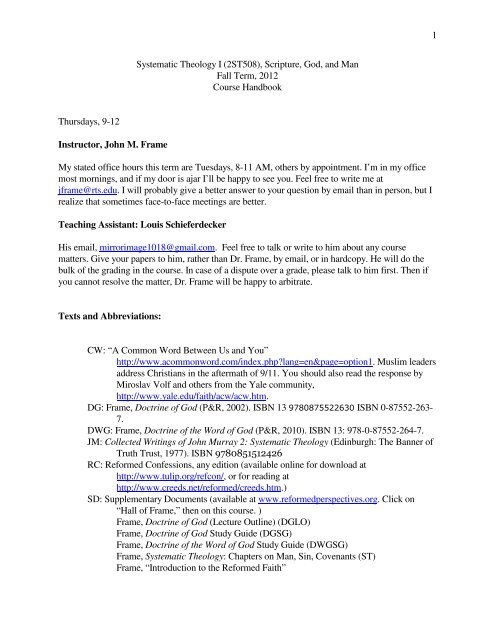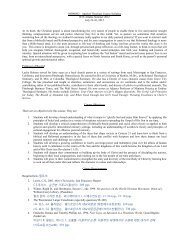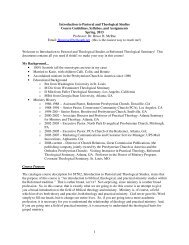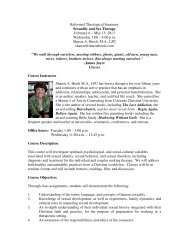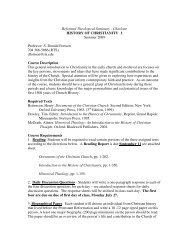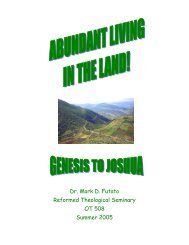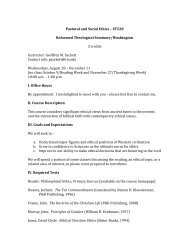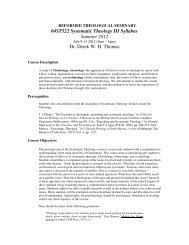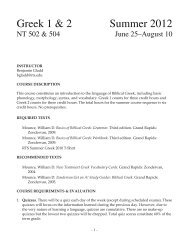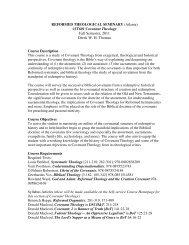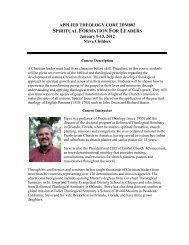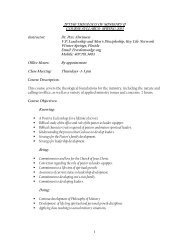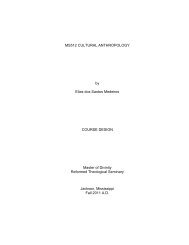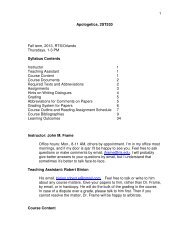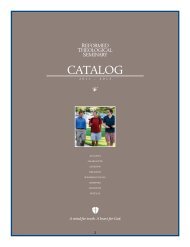2ST508 - Reformed Theological Seminary
2ST508 - Reformed Theological Seminary
2ST508 - Reformed Theological Seminary
You also want an ePaper? Increase the reach of your titles
YUMPU automatically turns print PDFs into web optimized ePapers that Google loves.
1<br />
Systematic Theology I (<strong>2ST508</strong>), Scripture, God, and Man<br />
Fall Term, 2012<br />
Course Handbook<br />
Thursdays, 9-12<br />
Instructor, John M. Frame<br />
My stated office hours this term are Tuesdays, 8-11 AM, others by appointment. I’m in my office<br />
most mornings, and if my door is ajar I’ll be happy to see you. Feel free to write me at<br />
jframe@rts.edu. I will probably give a better answer to your question by email than in person, but I<br />
realize that sometimes face-to-face meetings are better.<br />
Teaching Assistant: Louis Schieferdecker<br />
His email, mirrorimage1018@gmail.com. Feel free to talk or write to him about any course<br />
matters. Give your papers to him, rather than Dr. Frame, by email, or in hardcopy. He will do the<br />
bulk of the grading in the course. In case of a dispute over a grade, please talk to him first. Then if<br />
you cannot resolve the matter, Dr. Frame will be happy to arbitrate.<br />
Texts and Abbreviations:<br />
CW: “A Common Word Between Us and You”<br />
http://www.acommonword.com/index.php?lang=en&page=option1. Muslim leaders<br />
address Christians in the aftermath of 9/11. You should also read the response by<br />
Miroslav Volf and others from the Yale community,<br />
http://www.yale.edu/faith/acw/acw.htm.<br />
DG: Frame, Doctrine of God (P&R, 2002). ISBN 13 9780875522630 ISBN 0-87552-263-<br />
7.<br />
DWG: Frame, Doctrine of the Word of God (P&R, 2010). ISBN 13: 978-0-87552-264-7.<br />
JM: Collected Writings of John Murray 2: Systematic Theology (Edinburgh: The Banner of<br />
Truth Trust, 1977). ISBN 9780851512426<br />
RC: <strong>Reformed</strong> Confessions, any edition (available online for download at<br />
http://www.tulip.org/refcon/, or for reading at<br />
http://www.creeds.net/reformed/creeds.htm.)<br />
SD: Supplementary Documents (available at www.reformedperspectives.org. Click on<br />
“Hall of Frame,” then on this course. )<br />
Frame, Doctrine of God (Lecture Outline) (DGLO)<br />
Frame, Doctrine of God Study Guide (DGSG)<br />
Frame, Doctrine of the Word of God Study Guide (DWGSG)<br />
Frame, Systematic Theology: Chapters on Man, Sin, Covenants (ST)<br />
Frame, “Introduction to the <strong>Reformed</strong> Faith”
2<br />
Recommended:<br />
Warfield, “A Brief and Untechnical Statement of the <strong>Reformed</strong> Faith”<br />
Van Til, “Nature and Scripture”<br />
John Murray, “The Attestation of Scripture”<br />
Frame, “In Defense of Something Close to Biblicism”<br />
Frame, “Traditionalism”<br />
Frame, The Islamic Doctrine of God Lecture Outline (IDG)<br />
Frame, The Islamic Doctrine of Scripture (IDS)<br />
The Collected Works of John M. Frame (P&R and Bits and Bytes, 2008), Vol. 1: three CDs or one<br />
DVD, including six books, many articles, and 70 hours of audio lectures on MP3s,<br />
including my lectures on Scripture and God. This volume focuses on systematic theology.<br />
Vol. 2 will deal specifically with apologetics, vol. 3 with ethics and worship. It costs a lot,<br />
but the cost per book (and other materials) is pretty low.<br />
John Frame, Perspectives on the Word of God (Wipf and Stock, 1999).<br />
ISBN 13 9780875522449 ISBN 1-57910-257-3. A short introduction to my approach to<br />
the Doctrine of the Word and Ethics.<br />
Norman Geisler, ed., Inerrancy (Zondervan, 1979). ISBN 13 9780310392811 ISBN 0-<br />
310-39281-0. Evangelical articles about the nature and problems of inerrancy, written for<br />
the International Council on Biblical Inerrancy. Generally high quality. I have assigned<br />
some of these chapters in past editions of this course.<br />
Alister McGrath, Christian Theology Reader (Blackwell, 2007 edition) ISBN-13:<br />
978140515358. ISBN-10: 1-4051-5358-X. I have required assignments from this book in<br />
the past, but will not do so this year. It has a great many short excerpts from important<br />
theological writers of history and of recent times.<br />
Anthony Hoekema, Created in God’s Image (Grand Rapids: Eerdmans, 1994).<br />
Meredith G. Kline, Images of the Spirit (Eugene, OR: Wipf and Stock, 1999). Important work on<br />
the image of God, among other things.<br />
Richard Pratt, Designed for Dignity (Phillipsburg: P&R, 2000). Popular treatment of the Doctrine<br />
of Man, theologically substantial.<br />
Systematic Theologies: Hodge, Bavinck, Berkhof, Grudem, Reymond<br />
Objectives<br />
1. To give reasons for confidence in the absolute authority of Scripture as God’s Word.<br />
Christ.<br />
2. To show that disbelief and disobedience to Scripture are inconsistent with faith in Jesus<br />
3. To present God as covenant Lord and ways of speaking about him consistent with his<br />
Lordship as revealed in Scripture.<br />
4. To elicit a greater love for our Triune God and his revelation.
3<br />
5. To help students to better understand themselves as the image of God, fallen into sin, in<br />
constant need of the redeeming work of Christ.<br />
Assignments<br />
1. Class attendance is required. I won’t call the roll, but students who are often absent or<br />
late without excuse will be penalized.<br />
2. You are asked to complete all reading assignments on the days indicated below. For the<br />
first and second parts of the course (Doctrine of God, Doctrine of the Word of God) I<br />
have supplied Study Guides (DGSG, DWGSG). For each class period, you are to<br />
prepare the material for the lesson assigned for that day. That means, you should be<br />
prepared to define any of the key terms or answer any of the questions. During these<br />
parts of the course, I will not lecture, as a rule, but will call on individual students to<br />
respond to Study Guide questions and define Key Terms. I may also ask questions that<br />
are not on the Study Guide, to determine how well you understand the issues. In the<br />
Doctrine of Man unit, the Study Guide comes at the end of the written materials, and we<br />
will deal with it the same way. Note: The material on Islam will be presented as<br />
lectures, without study guides.<br />
3. Midterm Test on the Doctrine of God unit (everything we have covered to that point).<br />
The test will be given in the library, and you may take it any time from the opening of<br />
the library on Monday, Sept. 24, to its closing on Saturday, Sept. 29. You are<br />
responsible to know in advance when the library is open and closed. Important note:<br />
Please do not use exams from past years to study for the Midterm or the Final. If you<br />
do, it will be considered cheating.<br />
4. Final Exam, only on the Doctrine of the Word of God and Doctrine of Man units<br />
(material covered since the midterm). Time and place will be announced. See important<br />
note under 3, above.<br />
5. Paper, 1500 words, due Wed., Dec. 5, 11 AM (Catalogue Deadline). Write a response to<br />
“A Common Word,”<br />
http://www.acommonword.com/index.php?lang=en&page=option1, including an<br />
evaluation of the Yale response, http://www.yale.edu/faith/acw/acw.htm. Frame’s<br />
lectures on the Islamic doctrines of God and Scripture may be helpful, in addition to the<br />
titles listed on Islam in the course bibliography. You may find it especially helpful to<br />
read Miroslav Volf’s Allah: a Christian Response, for Volf’s book sets forth in more<br />
detail the theology underlying Yale’s response. The assignment is, however, a response<br />
paper, not a research paper. Your focus should be on the Muslim document and the Yale<br />
response.
4<br />
Grading<br />
All assignments will be graded on a pass-fail basis. Your final grade will be calculated thus, based<br />
on assignments 2-5 above:<br />
Passing work on assignments 2-5: A.<br />
Passing work on three of four assignments: B.<br />
Passing work on two of four: C.<br />
Passing work on one of four: D.<br />
No passing work: F.<br />
Weekly Assignments<br />
All dates are Thursdays.<br />
Aug. 23: Introduction to the Doctrine of God<br />
DG, 1-46, 80-115.<br />
DGSG, Lessons 1-3, 5-7.<br />
SD: Frame, “Introduction to the <strong>Reformed</strong> Faith”<br />
Warfield, “A Brief and Untechnical Statement of the <strong>Reformed</strong> Faith”<br />
Aug. 30: God’s Sovereignty, Human Responsibility, Evil<br />
DG, Chapters 4, 8, 9. For assignments in DG, you may find it helpful to consult<br />
DGLO as well, which provides an outline of DG. We may occasionally use that<br />
outline in class as well. Large Roman numerals in the outline correspond to chapter<br />
numbers in the book.<br />
DGSG, Questions on the above chapters (similarly each week from now on).<br />
Second Helvetic Confession, 9.<br />
Westminster Confession of Faith, 3.1, 9.1-5.<br />
Sept. 6: The Acts of God<br />
DG and DGSG, Chapters 13-16 (Notice that we are skipping some material.)<br />
RC<br />
Belgic Confession, 14-16.<br />
CD: First Head, Articles 1-18 and Rejection of Errors<br />
Heidelberg Catechism, 26-28.<br />
Second Helvetic Confession, 6-7, 10.<br />
Westminster Confession of Faith, 3-5.<br />
Westminster Larger Catechism, 12-19.
5<br />
Sept. 13: Attributes of God<br />
Westminster Shorter Catechism, 7-11.<br />
DG 19-26 (Omitting some more topics.)<br />
DGSG<br />
Lesson 19: questions 2, 9, 10<br />
20: 3, 5, 7, 10, 17<br />
21: 1, 4, 6, 9<br />
22: 7, 8-11, 12, 13<br />
23: 2, 10, 11<br />
24: 4, 5, 8, 9<br />
25:1, 3, 10, 13<br />
26: 2, 3, 4<br />
RC:<br />
Westminster Confession of Faith, 2<br />
Westminster Larger Catechism 7-8<br />
Westminster Shorter Catechism, 4-5.<br />
Sept. 20: The Trinity; The Islamic Doctrine of God<br />
DG and DGSG, Chapters 27-29.<br />
Westminster Confession of Faith, 2<br />
Westminster Larger Catechism, 9-11<br />
Frame, IDG Lecture Outline<br />
Sept. 24-29: MIDTERM EXAMINATION. Take the exam in the library, any time from its opening<br />
on Monday the 24th to its closing on Saturday the 29 th , if indeed the library is open then. Finding<br />
the library’s schedule is your responsibility. The exam will deal only with the Doctrine of God, that<br />
is, the assignments made through Sept. 20.<br />
Sept. 27: The Word of God<br />
DWG and DWGSG, Chapters 1-7.<br />
Oct. 4: Nature and Media of the Word<br />
DWG and DWGSG, 8-15.<br />
SD: Van Til, “Nature and Scripture” Note: Don’t get tied up with all the philosophers here.<br />
Focus on Van Til’s basic comparison and contrast between the attributes of natural<br />
and scriptural revelation.<br />
RC<br />
Belgic Confession, Articles I-VII
6<br />
Confession of 1967, I, C, 2<br />
Canons of Dordt, Third and Fourth Heads, I-V<br />
Heidelberg Catechism, Questions 1-3, 19, 21-23, 67<br />
Second Helvetic Confession, I-II<br />
Westminster Confession of Faith Chapters 1, 14.<br />
Westminster Larger Catechism, Questions 1-5<br />
Westminster Shorter Catechism, Questions 1-3<br />
Oct. 11: NO CLASS (Reading week)<br />
Oct. 18: The Written Word<br />
DWG and DWGSG, 16-23, 26, 29-32.<br />
SD: Murray, “The Attestation of Scripture,” Part 1, “The Objective Witness.”<br />
Frame, “In Defense of Something Close to Biblicism”<br />
Frame, “Traditionalism.”<br />
Oct. 25: The Transmission of Scripture<br />
DWG and DWGSG 33-34, 38-40<br />
Nov. 1: Person Revelation; Islamic doctrine of Scripture.<br />
DWG and DWGSG, 41-46<br />
SD: Murray, “The Attestation of Scripture,” Part 2, “The Internal Testimony.”<br />
Frame, IDS, Lecture Outline<br />
Nov. 8: The Creation and Nature of Man<br />
Nov. 15: Sin<br />
Frame, ST, Chapter on Man. Discussion on key terms and questions at end.<br />
JM, 1-46, 60-66<br />
Westminster Confession of Faith, Chapter 4.<br />
Westminster Larger Catechism, Q 17.<br />
Westminster Shorter Catechism, Question 10.<br />
Belgic Confession 14<br />
Frame, ST, Chapter on Sin. Discussion of key terms and questions at the end.<br />
JM, 67-119<br />
Westminster Confession of Faith, Chapter 6.<br />
Westminster Larger Catechism, Q 21-29.<br />
Westminster Shorter Catechism, Q 13-20<br />
Belgic Confession 14, 15, 17.
7<br />
Canons of Dordt, Third and Fourth Heads<br />
Heidelberg Catechism, Q 3-14.<br />
Nov. 22: THANKSGIVING: no class.<br />
Nov. 29: Covenants<br />
Frame, ST, Chapter on Covenants. Discussion of key terms and questions at end.<br />
JM, 47-59.<br />
SD: Frame, “God’s Covenants.” Be prepared to define key terms and answer study<br />
questions at the end of this article.<br />
Westminster Confession of Faith, Chap. 7.<br />
Westminster Larger Catechism, Q 30-36.<br />
Westminster Shorter Catechism, Q 20.<br />
Course Bibliographies<br />
Introduction to the <strong>Reformed</strong> Faith<br />
See also the <strong>Reformed</strong> systematic theologies listed under “Systematic Theology and <strong>Theological</strong><br />
Method”<br />
Bavinck, Herman, Our Reasonable Faith (Baker, 1956). Bavinck<br />
was the leading Dutch dogmatician of the late 19 th , early<br />
20 th centuries. This is his brief, 568 page (!) summary of his four-volume Dogmatics. His<br />
full Dogmatics has recently been translated into English (Grand Rapids: Baker, four<br />
volumes) and is invaluable.<br />
Boettner, Lorraine, The <strong>Reformed</strong> Doctrine of Predestination<br />
(P&R). A good, standard work.<br />
Boice, James, Foundations of the Faith. A popular summary of<br />
<strong>Reformed</strong> doctrine.<br />
Bratt, J., ed., The Heritage of John Calvin (1973). Essays on<br />
Calvin and his influence. Note comparisons between<br />
Calvin and Thomas Aquinas (Breen) and between Calvin<br />
and Arminius (Bangs).<br />
Calvin, John, Concerning the Eternal Predestination of God<br />
(“Calvin’s Calvinism.” His argument against Pighius on predestination.)<br />
--, Institutes of the Christian Religion. The<br />
definitive formulation. You must read this<br />
before leaving seminary.<br />
Coppes, Leonard J., Are Five Points Enough? Ten Points<br />
of Calvinism (Manassas: Reformation Educational<br />
Foundation, 1980).
Elwell, Walter, ed., Handbook of Evangelical Theologians<br />
(Baker, 1993). Biographies and emphases of various<br />
thinkers, including Warfield, Berkhof, Machen, Van Til,<br />
Murray, Clark, Berkouwer, Schaeffer, Henry, Hoekema,<br />
Carnell, Packer, McGrath.<br />
Hagopian, David G., ed., Back to Basics (P&R, 1996).<br />
Hodge, A. A., Outlines of Theology (Zondervan, 1879, 1972). A<br />
one-volume work by the son of Charles Hodge.<br />
Kline, Meredith, The Structure of Biblical Authority (Eerdmans,<br />
1972). Best source for the “covenant” concept expounded<br />
in lecture.<br />
Klooster, Fred, Calvin’s Doctrine of Predestination. (Grand Rapids: Baker, 1977).<br />
Kuyper, A., Lectures on Calvinism (Eerdmans, 1961). Another<br />
“must read.” Kuyper was a great genius: philosopher,<br />
founder of a university, newspaper editor, preacher,<br />
founder of a new denomination, devotional writer. These<br />
lectures seek to apply Calvinism to all areas of life,<br />
thus expressing the major thrust of his thought.<br />
Luther, Martin, The Bondage of the Will (Luther had great affection for this<br />
volume, but his Lutheran successors didn’t follow its teaching. Shows<br />
how important the doctrine of predestination was to the early Reformation.)<br />
Machen, J. Gresham, The Christian Faith in the Modern World.<br />
--, The Christian View of Man. These two books are simple<br />
radio addresses expounding the basics of the <strong>Reformed</strong><br />
faith. Vivid, compelling style.<br />
--, Christianity and Liberalism. Still the best book<br />
in contrasting <strong>Reformed</strong> Christianity with its<br />
“liberal” counterfeit.<br />
McKim, Donald K., ed., Encyclopedia of the <strong>Reformed</strong> Faith (Westminster/<br />
John Knox Press, 1992). Some contributors are liberal and/or<br />
limited inerrantist, but on the whole this is a valuable reference<br />
work.<br />
Murray, J., Calvin on Scripture and the Sovereignty of God (Baker, 1960). These<br />
articles are also found in Vol. IV of Murray’s Collected Writings (Banner<br />
of Truth, 1982).<br />
Palmer, E., The Five Points of Calvinism (Baker, 1972). Accurate,<br />
straightforward.<br />
Pinnock, C., ed., The Grace of God and the Will of Man<br />
(Zondervan, 1989). Essays against Calvinism and<br />
in favor of Arminianism.<br />
Schreiner, Thomas R., and Ware, Bruce A., The Grace of God and the<br />
Bondage of the Will (Baker, 1995). Articles on many issues in<br />
dispute between Calvinists and Arminians, taking the Calvinist<br />
side.High quality of thought and scholarship.<br />
Steele, D., and Thomas, C., The Five Points of Calvinism (P&R, 1965).<br />
8
9<br />
Not much argument here, but good summary statements, proof<br />
texts, historical surveys, analytical bibliographies.<br />
Sproul, R. C., many popular books and tapes on <strong>Reformed</strong> doctrines,<br />
available through the Ligonier Valley Study Center in Orlando, Florida.<br />
Sproul is the best popular communicator of <strong>Reformed</strong> doctrine<br />
around. Ligonier also sells tapes and booklets by the late John<br />
H. Gerstner, Sproul’s mentor. These should not be missed.<br />
Van Til, Cornelius, Christian Apologetics, 1-22. Van Til’s<br />
summary of the <strong>Reformed</strong> faith.<br />
Warfield, B. B., Calvin and Calvinism.<br />
--, Calvin and Augustine.<br />
Revelation and Scripture<br />
See also the various systematic theologies listed in the “Theology” bibliography below.<br />
Archer, G., Encyclopedia of Bible Difficulties (Grand Rapids,<br />
Zondervan, l982).<br />
Baillie, John, The Idea of Revelation in Recent Thought<br />
(NY: Columbia Univ. Press, 1956). Handy summary of<br />
the views of Barth, Brunner, Bultmann, Cullmann,<br />
Tillich, and other liberal and neo-orthodox thinkers.<br />
Barr, James, Fundamentalism. Critique of evangelical views<br />
of scripture.<br />
Barth, Karl, Church Dogmatics, I/2, 457-740. Fountainhead of<br />
neo-orthodoxy.<br />
Bavinck, Herman,<br />
--, The Philosophy of Revelation (Grand Rapids:<br />
Baker, 1979).<br />
Beegle, Dewey, Scripture, Tradition and Infallibility (1973).<br />
Limited inerrancy.<br />
Berkhof, Louis, Introduction to Systematic Theology (Grand<br />
Rapids: Baker, 1979). Deals with theological method and<br />
the doctrine of revelation-Scripture.<br />
Berkouwer, G. C., General Revelation (Grand Rapids: Eerdmans,<br />
1955).<br />
--, Holy Scripture (Grand Rapids, Eerdmans, 1975).<br />
A sophisticated statement of a limited inerrancy<br />
position.<br />
Bloesch, Donald, Holy Scripture (Downers Grove, Inter-Varsity<br />
Press, 1994). Limited inerrancy.<br />
Boice, James M., ed., The Foundation of Biblical Authority<br />
(Zondervan, 1978).<br />
Bruce, F. F., The Canon of Scripture (IVP, 1988)<br />
Carson, D., and Woodbridge, J., ed., Scripture and Truth
(Zondervan, 1983).<br />
--, Hermeneutics, Authority and Canon (Zondervan, 1986, 1995);<br />
includes essay by Frame on the internal testimony of the Spirit.<br />
Clark, G., God’s Hammer (Jefferson, Md., Trinity Publishing Co.,1982).<br />
Conn, Harvie, ed., Inerrancy and Hermeneutic (Grand Rapids,<br />
Baker, 1988). A WTS-Phila. symposium.<br />
Davis, S. T., The Debate About the Bible (Philadelphia, Westminster<br />
Press, 1977)-- limited inerrancy.<br />
Demarest, B., General Revelation (Zondervan, 1982)-- Baptist from<br />
Denver <strong>Seminary</strong>.<br />
Erickson, M., The Living God (Grand Rapids: Baker, 1973). A book<br />
of readings on various theological topics including this<br />
one. Articles by Calvin, Kantzer, Ramm, Warfield<br />
represent the historic protestant position. Barth and<br />
Hordern represent neo-orthodoxy. Orr and Beegle represent<br />
limited inerrancy. Dodd represents older liberalism.<br />
Geisler, N., ed., Biblical Errancy (Zondervan, 1981). See Frame’s<br />
review in Westminster <strong>Theological</strong> Journal XLV, 2 (Fall, 1983).<br />
The book deals with philosophers whose influence weakened<br />
confidence in biblical inerrancy.<br />
--, ed., Inerrancy (Zondervan, 1979)-- the papers of the first<br />
conference of the International Council on Biblical Inerrancy.<br />
Hannah, J., ed., Inerrancy and the Church (Chicago, Moody Press,<br />
1984). Like the Boice and Geisler volumes, this book is a<br />
project of ICBI.<br />
Helm, P., Divine Revelation: The Basic Issues (Westchester, Ill.,<br />
Crossway Books, 1982). Helm is a Christian philosopher at the<br />
King’s College, Univ. of London, England, former editor<br />
of Banner of Truth.<br />
--, and Carl Trueman, eds, The Trustworthiness of God: Perspectives on the Nature of<br />
Scripture (Grand Rapids: Eerdmans, 2002).<br />
Henry, Carl F. H., God, Revelation and Authority, 6 volumes<br />
(Waco, Word, 1976 to 1984). The first four volumes deal with<br />
the doctrine of revelation, the last two with the doctrine<br />
of God. This is a fine work, certainly the definitive<br />
evangelical treatment to date.<br />
Kaiser, Walter, The Uses of the Old Testament in the New (Chicago,<br />
Moody, 1985). Did the N.T. writers misuse the O.T.? Kaiser’s<br />
treatment is helpful.<br />
Kistler, Don, ed., Sola Scriptura: the Protestant Position on the<br />
Bible (Morgan, PA: Soli Deo Gloria, 1995). Confessional<br />
protestants, including Robert Godfrey, R. C. Sproul,<br />
Sinclair Ferguson.<br />
Kline, Meredith G., The Structure of Biblical Authority (Grand<br />
Rapids, Eerdmans, 1972). The most significant re-thinking<br />
10
of the orthodox position since Warfield.<br />
Kuyper, Abraham, Principles of Sacred Theology (Eerdmans, 1965).<br />
Part of his Encyclopedia. Deals with the nature of<br />
theology and revelation. K. was a great <strong>Reformed</strong> leader<br />
of the 19 th century.<br />
Lewis, Gordon, and Demarest, Bruce, ed., Challenges to Inerrancy<br />
(Chicago, Moody, 1984). Another ICBI symposium, this one<br />
on theological attacks against inerrancy.<br />
Lindsell, Harold, The Battle for the Bible (Grand Rapids,<br />
Zondervan, 1976). This states a “full inerrantist”<br />
position and attacks limited inerrancy. At points,<br />
however, it betrays a somewhat wooden hermeneutic. The<br />
limited inerrantists like to quote him as an extreme<br />
example of what they oppose.<br />
Marshall, I. Howard, Biblical Inspiration (Grand Rapids,<br />
Eerdmans, 1982). “Mediating” evangelical treatment.<br />
McKim, Donald, ed., The Authoritative Word (Grand Rapids:<br />
Eerdmans, 1983). Essays supporting limited inerrancy.<br />
Montgomery, John W., ed., God’s Inerrant Word (Bethany, 1975).<br />
Contains a number of useful articles by Packer,<br />
Montgomery, Pinnock, Peter Jones, R. C. Sproul,<br />
John Gerstner, and John Frame.<br />
Morris, Leon, I Believe in Revelation (Eerdmans, 1976).<br />
Murray, John, Calvin on Scripture and Divine Sovereignty<br />
(Grand Rapids, Baker, 1960).<br />
Nash, Ronald, The Word of God and the Mind of Man (Zondervan, 1982).<br />
Full inerrancy.<br />
Nicole, R., and Michaels, J. R., ed., Inerrancy and Common Sense<br />
(Grand Rapids, Baker, 1980).<br />
Orr, James, Revelation and Inspiration (Grand Rapids: Baker,<br />
1969, originally published in 1910.) Fountainhead of<br />
limited inerrancy views.<br />
Packer, J. I., Beyond the Battle for the Bible (Westchester, Ill.,<br />
Cornerstone Books, 1980).<br />
--, Fundamentalism and the Word of God (Grand Rapids,<br />
Eerdmans, 1958). A classic exposition of the historic<br />
protestant view.<br />
Pinnock, C., The Scripture Principle (N. Y., Harper, 1984).<br />
Polman, A., Barth (Presbyterian and <strong>Reformed</strong>), 16-30. Pretty<br />
good summary and critique of Barth’s view.<br />
Radmacher, E., ed., Can We Trust the Bible? (Wheaton, Tyndale,<br />
1979). Interesting articles by Packer, Clowney, Sproul and<br />
others.<br />
--, and Preus, R., eds., Hermeneutics, Inerrancy and the Bible<br />
(Zondervan, 1984). Papers of the second ICBI conference, on<br />
11
hermeneutics.<br />
Ridderbos, H. N., The Authority of the New Testament Scriptures<br />
(Phila., Presbyterian and <strong>Reformed</strong>, 1963). Good<br />
historical and biblico-theological treatment of<br />
canonicity.<br />
--, Studies in Scripture and its Authority (Grand Rapids:<br />
Eerdmans, 1978). Generally supporting a limited inerrancy<br />
position.<br />
Rogers, Jack, ed., Biblical Authority (Waco: Word Books, 1977).<br />
Articles defending limited inerrancy.<br />
Rogers, J., and McKim, D., The Authority and Interpretation of the<br />
Bible (N.Y., Harper, 1979)-- the definitive statement of a<br />
“limited inerrancy” position.<br />
Runia, Klaas, Karl Barth’s Doctrine of Holy Scripture.<br />
Rushdoony, R. J., Infallibility: An Inescapable Concept (Vallecito,<br />
Calif., Ross House Books, 1978).<br />
Sproul, R. C., Explaining Inerrancy: a Commentary (Oakland, Calif.,<br />
ICBI, 1980). Commentary on the ICBI statement on inerrancy.<br />
Stonehouse, Ned, and Woolley, Paul, ed., The Infallible Word<br />
(Phila: Presbyterian and <strong>Reformed</strong>, 1946). Collection of<br />
essays on Biblical inspiration and authority by the<br />
faculty of WTS/Phila. The contributions of Murray and<br />
Van Til are especially notable.<br />
Trembath, Kern R., Evangelical Theories of Biblical Inspiration<br />
(NY: Oxford Univ. Press, 1987). Surveys various views.<br />
Favors Thomistic alternative.<br />
Turretin, F., The Doctrine of Scripture (Grand Rapids, Baker, 1981)--<br />
part of Turretin’s Institutes dealing with Scripture. Of course,<br />
the whole of the Institutes is also available now; see below under<br />
Systematic Theology and <strong>Theological</strong> Method.<br />
Vander Stelt, J., Philosophy and Scripture (Marlton, N.J., Mack<br />
Publishing Co., 1978). Accuses old Princeton and Westminster<br />
(especially Van Til) of holding a rationalistic view of<br />
Scripture. I don’t find it at all plausible.<br />
Van Til, Cornelius, A Christian Theory of Knowledge (Phila.: P&R,<br />
1969). Emphasizes the self-attestation of Scripture.<br />
--, Introduction to Systematic Theology (P&R,<br />
1973).<br />
--, “Nature and Scripture,” in Stonehouse and Woolley,<br />
ed., The Infallible Word.<br />
--, The Protestant Doctrine of Scripture.<br />
Warfield, B. B., The Inspiration and Authority of the Bible<br />
(P&R). Definitive.<br />
--, Limited Inspiration (P&R).<br />
Weeks, Noel, The Sufficiency of Scripture (Edinburgh, Banner of<br />
12
13<br />
Truth, 1988). WTS graduate, teaches ancient history at<br />
Univ. of Sydney, Australia. Very stimulating.<br />
Woodbridge, J., Biblical Authority (Zondervan, 1982)-- excellent<br />
critique of the Rogers-McKim volume.<br />
Wolterstorff, Nicholas. Divine Discourse (NY: Cambridge University Press, 1997).<br />
Reflections by a Christian philosopher of <strong>Reformed</strong> background.<br />
Systematic Theology and <strong>Theological</strong> Method<br />
In this bibliography, I have included both complete systems of theology and writings about<br />
theology and theological method. You will find that many of the systematic theologies begin with<br />
discussions of theology and theological method. They are, of course, also important for our study of<br />
the Doctrine of God.<br />
Barth, Karl, Church Dogmatics (Macmillan). The fountainhead<br />
of neo-orthodoxy. Probably the most influential<br />
theology of the 20 th century. See especially I/1,<br />
1-25, II/1, 1ff. on the nature and method of theology.<br />
Bavinck, Herman, <strong>Reformed</strong> Dogmatics: Prolegomena (Grand Rapids: Baker, 2003). At last,<br />
Bavinck’s four-volume Dogmatics is being translated into English. This is the first volume,<br />
dealing with theological method and Scripture.<br />
Berkhof, Louis, Introduction to Systematic Theology (Grand<br />
Rapids: Baker, 1979). Deals with theological method and<br />
the doctrine of revelation-Scripture.<br />
--, Systematic Theology (Banner of Truth). Standard<br />
one-volume <strong>Reformed</strong> work. Good summary, based primarily<br />
on Hodge and on Herman Bavinck’s four-volume Dutch work<br />
which is still untranslated into English.<br />
Buswell, James O., Systematic Theology (Zondervan). Buswell was<br />
a professing Calvinist, though I believe he occasionally<br />
veered in an Arminian direction. Premillenial.<br />
Calvin, John, Institutes of the Christian Religion. Wonderful<br />
book. Scriptural, devotional, powerful, practical.<br />
The seed-bed of all <strong>Reformed</strong> theology. Drink deep of it.<br />
Chafer, Lewis Sperry, Systematic Theology (Dallas <strong>Theological</strong><br />
<strong>Seminary</strong> Press). This seven volume work is the standard<br />
statement of “original dispensationalism.”<br />
Conn, Harvie, Contemporary World Theology (Phila.: P&R, 1973).<br />
A handy guidebook concerning some major theological<br />
schools of thought.<br />
--, Eternal Word and Changing Worlds (Grand Rapids:<br />
Zondervan, 1984). Concerned with “contextualization:”<br />
the process of translating scripture into the thoughtforms<br />
of various cultures.<br />
Davis, John Jefferson, Foundations of Evangelical Theology
(Grand Rapids: Baker, 1984).<br />
Dooyeweerd, H., In the Twilight of Western Thought, 113-172.<br />
Dutch philosopher’s critique of the method of classical<br />
<strong>Reformed</strong> theology. Somewhat confused in my opinion.<br />
Elwell, Walter, ed., Evangelical Dictionary of Theology (Baker,<br />
1984). Some useful articles here.<br />
Erickson, Millard, Christian Theology (Baker). Middle of the<br />
road evangelicalism. Amyraldian.<br />
--, ed. The Living God (Grand Rapids: Baker, 1975).<br />
See significant articles here on the nature and method<br />
of theology, particularly those by Hodge (<strong>Reformed</strong>),<br />
Mullins (Baptist emphasizing experience),<br />
De Wolf (liberal), Hordern (neo-orthodox), Van Til<br />
(<strong>Reformed</strong>), Tillich (radical liberal), Bultmann<br />
(radical liberal), and Gill (language analyst).<br />
Ferguson, Sinclair, and Wright, David F., ed., New Dictionary<br />
of Theology (Downers Grove: IVP, 1988).<br />
Frame, John, Cornelius Van Til: An Analysis of His Thought<br />
(Phillipsburg: P&R, 1995). Chapters 4-14 deal in<br />
various ways with Van Til’s concept of theology.<br />
--, Doctrine of the Knowledge of God (Phila: P&R, 1987).<br />
Gaffin, R., “Contemporary Hermeneutics, WTJ 31:2 (May, 1969),<br />
129-144.<br />
--, “Geerhardus Vos and the Interpretation of Paul,” in<br />
Geehan, E. R., ed., Jerusalem and Athens (P&R, 1971).<br />
Gaffin argues that systematic theology should be controlled<br />
by, and reflect the structure of, biblical theology.<br />
--, “Systematic Theology and Biblical Theology,”<br />
in Skilton, ed., The New Testament Student and<br />
Theology, 32-50.<br />
Grenz, Stanley, Theology for the Community of God (Nashville:<br />
Broadman and Holman, 1994). A big, fat book. Generally<br />
evangelical, but I confess I don’t find it very<br />
interesting.<br />
Grudem, Wayne, Systematic Theology (Grand Rapids: Zondervan,<br />
1994). Excellent in many ways; incorporates some of<br />
Frame’s lecture material from Grudem’s years as F’s<br />
student. <strong>Reformed</strong>, but defends continuing charismatic<br />
gifts.<br />
Hodge, Charles, Systematic Theology (Eerdmans). A three-volume<br />
work representing Old Princeton Presbyterian theology<br />
circa 1870. Still a standard work of <strong>Reformed</strong> theology.<br />
Hoeksema, Herman, <strong>Reformed</strong> Dogmatics (<strong>Reformed</strong> Free Publishing<br />
Assn.) Often called a “hyper-Calvinist,” Hoeksema<br />
denied the doctrine of common grace and left the<br />
14
Christian <strong>Reformed</strong> Church to form the Protestant <strong>Reformed</strong><br />
Church. A very brilliant thinker.<br />
Holmer, Paul, The Grammar of Faith (Harper, 1978).<br />
Wittgensteinian account of the nature of theology.<br />
See Frame’s review in WTJ 42:1 (Fall, 1979), 219-231.<br />
Horton, Michael S., Covenant and Eschatology (Louisville: Westminster John Knox Press, 2002).<br />
Horton and I have some major differences, but I must admit that he has read a great many<br />
historic and contemporary theologians and has illuminated their contributions. The book is,<br />
however, essentially a “triangulation” (in terms of my “Traditionalism” paper).<br />
Jewett, Paul K., God, Creation, and Revelation: a Neo-<br />
Evangelical Theology (Grand Rapids: Eerdmans, 1991).<br />
“Neo-evangelical” these days tends to mean limited<br />
inerrancy and feminism, both of which Jewett endorses.<br />
Kelsey, David, The Uses of Scripture in Recent Theology. See<br />
also Frame’s review in WTJ 39:2 (Spring, 1977): 328-353.<br />
Explores the methods of modern theologians from Warfield<br />
to Bultmann; shows that they mean very different things<br />
when they claim to do theology “in accord with<br />
Scripture.”<br />
Kuyper, Abraham, Principles of Sacred Theology (Eerdmans, 1965).<br />
Part of his Encyclopedia. Deals with the nature of<br />
theology and revelation. See especially 228-340, 565-636.<br />
Lewis, Gordon, and Demarest, B., Integrative Theology<br />
(Zondervan), 3 vols. Baptist writers trying to combine<br />
historical, exegetical, biblical, and systematic<br />
theology. I don’t think it’s very successful. That<br />
project requires many more pages and more careful<br />
scholarship.<br />
Lindbeck, George, The Nature of Doctrine (Phila.: Westminster<br />
Press, 1984). An influential book on theological method.<br />
See Frame, DKG, pp. 380-81. It has recently been cited<br />
as the original document of “postliberalism.”<br />
McGrath, Alister, Christian Theology, An Introduction (Cambridge:<br />
Blackwell, 1996).<br />
McKim, Donald, Encyclopedia of the <strong>Reformed</strong> Faith (Westminster/<br />
John Knox Press, 1992). A broad range of theological<br />
positions are represented here.<br />
Moltmann, Jurgen, The Theology of Hope (NY: Harper, 1965). Wellknown<br />
contemporary liberal theologian argues that<br />
theology must stress hope for the future. But for him<br />
the future is always “open.”<br />
Mueller, J. Theodore, Christian Dogmatics (Concordia). A standard<br />
one-volume conservative Lutheran theology.<br />
Murray, John, Collected Writings (4 Volumes) (Banner of Truth).<br />
Murray taught for many years at Westminster in<br />
15
Philadelphia. His formulations of <strong>Reformed</strong> theology are,<br />
altogether, the best available. The exegesis is thorough<br />
and cogent. Volume 2 of this set contains his basic<br />
seminary lectures in Systematic Theology. See also his<br />
articles on “Systematic Theology.” Murray was conservative<br />
in many ways, noticeably in his advocacy of the exclusive<br />
use of Psalms in worship. But his lectures were not,<br />
for the most part, reviews of <strong>Reformed</strong> traditions, but<br />
almost entirely exegetical. And in his accounts of theological<br />
method, he emphasizes independence from tradition.<br />
Muller, Richard, Post-Reformation <strong>Reformed</strong> Dogmatics. Multivolume<br />
survey of post-Reformation theologians on the<br />
topics of systematic theology.<br />
--, The Study of Theology (Grand Rapids: Zondervan,<br />
1991). A discussion of theological method by a professor<br />
at Calvin <strong>Seminary</strong>. See my review in WTJ 56 (1994),<br />
133-151, and Muller’s reply to me in the following issue.<br />
I am unmoved.<br />
Pannenberg, Wolfhart, Systematic Theology (Grand Rapids:<br />
Eerdmans, 1988), 3 volumes. Pannenberg’s theology is<br />
not orthodox, despite some appearances to the contrary.<br />
He is deeply influenced by Hegelian rationalism. But the<br />
intellectual quality of his work, including the very fine<br />
distinctions he regularly draws, is quite remarkable.<br />
Pieper, Francis, Christian Dogmatics (Concordia). A three volume<br />
orthodox Lutheran theology. Mueller (above) summarizes<br />
this.<br />
Poythress, Vern, Symphonic Theology: The Validity of Multiple<br />
Perspectives in Theology (Zondervan, 1987). My<br />
theological soul-mate.<br />
Rushdoony, R. J., Systematic Theology (Ross House, 1994). A twovolume<br />
<strong>Reformed</strong> work. Rushdoony is the founder of the<br />
Christian Reconstruction or Theonomy movement, and his<br />
political and social interests are evident here. It is<br />
not an exegetically developed exposition of <strong>Reformed</strong><br />
theology; it is rather a series of the author’s thoughts<br />
relating various doctrines to his concerns. Nevertheless<br />
it is a book of some interest.<br />
Shedd, W. G. T., Dogmatic Theology. Another 19 th century classic<br />
of American Presbyterianism. Somewhat a priorist in<br />
epistemology.<br />
Spkyman, Gordon, Reformational Theology (Grand Rapids: Eerdmans,<br />
1992). Applies the approach of Dooyeweerdian philosophy<br />
to the work of dogmatics. Not terribly helpful, in my<br />
view.<br />
16
17<br />
Strong, W. H., Systematic Theology (Revell). A standard text of<br />
Baptist theology from the 19 th century.<br />
Thielicke, Helmut, The Evangelical Faith (Eerdmans). A<br />
three-volume Lutheran theology from the mid-20 th century.<br />
Somewhat influenced by neo-orthodoxy, but often quite<br />
conservative.<br />
--, A Little Exercise for Young Theologians. It’s<br />
important to read this before you get very far along<br />
in your theological study.<br />
Tillich, Paul, Systematic Theology, 3 vols. Radically liberal,<br />
hardly affirms anything that can be recognized as<br />
Christian. A philosophy of being and non-being with<br />
some Christian language attached.<br />
Turretin, F., Institutes of Elenctic Theology (Phillipsburg:<br />
Presbyterian and <strong>Reformed</strong>, 1994). Edited by<br />
James Dennison. Three volumes. This 17 th century work<br />
was the basic textbook at Princeton <strong>Seminary</strong> before<br />
the completion of Hodge’s systematics. A brilliant<br />
and comprehensive work.<br />
Van Til, Cornelius, Introduction to Systematic Theology (P&R,<br />
1973). Van Til’s thoughts on the nature and method<br />
of theology, revelation, scripture, and the doctrine of<br />
God.<br />
Vos, Geerhardus, Biblical Theology. On pp. 1-27, he discusses<br />
the relation of biblical theology to the other<br />
theological disciplines.<br />
Warfield, B. B., “The Idea of Systematic Theology,” in his<br />
Studies in Theology (P&R).<br />
Weber, Otto, Foundations of Dogmatics (Eerdmans). Neo-orthodox.<br />
Wiley, H. Orton, Christian Theology (Beacon Hill Press).<br />
Standard Arminian work.<br />
Woodbridge, John, and McComiskey, Thomas, ed., Doing Theology<br />
in Today’s World (Grand Rapids: Zondervan, 1991). Some<br />
interesting essays on the nature and method of theology<br />
by evangelical and neo-evangelical writers.<br />
Doctrine of God (General)<br />
Alston, William P., ed., Divine Nature and Human Language<br />
(Ithaca: Cornell Univ. Press, 1989). 279. p. Philosophical.<br />
Anderson, R. S., Historical Transcendence and the Reality of God, 1975.<br />
Barth, Karl, Church Dogmatics II/1, 2.<br />
--, The Humanity of God (Atlanta: John Knox, 1960,<br />
1976). 3.45. 96. p.
Bavinck, Herman, The Doctrine of God (Grand Rapids: Baker, 1951,<br />
77). 5.95. 407. p.<br />
Beaty, Michael D., ed., Christian Theism and the Problems of<br />
Philosophy (Notre Dame: UND Press, 1990). 380. p.<br />
Boice, James M., Our Sovereign God.<br />
Boyd, Gregory A., God of the Possible (Grand Rapids: Baker, 2000). Open theist.<br />
Bray, Gerald, The Doctrine of God (Downers Grove: IVP, 1993).<br />
281. p. Evangelical. Stimulating.<br />
Brunner, Emil, The Christian Doctrine of God, I. Neo-orthodox.<br />
Charnock, Stephen, The Existence and Attributes of God<br />
(Sovereign Grace Book Club, no pub. data.) 802. h. Classic<br />
<strong>Reformed</strong> work.<br />
Cottrell, Jack, What the Bible Says About God the Creator<br />
(Joplin, MO: College Press, 1983). 518. h.<br />
--, What the Bible Says About God the Redeemer<br />
(Joplin: College Press, 1987). 598. h.<br />
--, What the Bible Says About God the Ruler<br />
(Joplin: College Press, 1984). 465. h.<br />
Cottrell is a Westminster/Phila. Graduate and theologian in the<br />
Church of Christ. He is, I think, the most cogent theologian<br />
today writing in the tradition of classical Arminianism.<br />
Craig, William L., The Only Wise God (Grand Rapids: Baker, 1987).<br />
7.95. 157. p. Craig is mainly known as a philosopher and<br />
evidential apologist. This volume deals with a number<br />
of questions concerning the doctrine of God.<br />
Davis, Stephen T., Logic and the Nature of God (Grand Rapids:<br />
Eerdmans, 1983). 171. h. Another philosophical<br />
treatment. Davis is a “limited inerrancy” evangelical.<br />
Farley, E., The Transcendence of God<br />
Feinberg, John, No One Like Him: The Doctrine of God (Crossway, 2001).<br />
Fortman, Edmund J., The Triune God (Grand Rapids: Baker, 1972).<br />
10.95. 382. p. Historical.<br />
France, R. T., The Living God (Downers Grove: IVP, 1970). 1.50.<br />
128. p. Evangelical.<br />
Freddoso, Alfred J., ed., The Existence and Nature of God<br />
(Notre Dame: UND Press, 1983). 190. p. Philosophical.<br />
Gilson, E., God and Philosophy (Thomist).<br />
Grant, Robert M., The Early Christian Doctrine of God (Charlottesville: University Press of<br />
Virginia, 1966). 3.50. 141. H. Historical and comparative religions approach.<br />
--, Gods and the One God (Phila: Westminster<br />
Press, 1986). 211. p.<br />
Hasker, William, God, Time, and Knowledge (Ithaca: Cornell UP,<br />
1989). 209. h. Open theist philosopher.<br />
Heim, Karl, God Transcendent. Neo-orthodox.<br />
Henry, Carl F. H., God, Revelation and Authority V (Waco:<br />
18
Word, 1982). 19.95. 443. h.<br />
--, God, Revelation and Authority VI (Waco: Word,<br />
1983). 19.95. 566. h. Evangelical. Volumes I-IV deal with<br />
the doctrine of Scripture. V-VI deal with the doctrine of God.<br />
Comprehensive.<br />
Jungel, Eberhard, God as the Mystery of the World (Grand Rapids:<br />
Eerdmans, 1983). 414. h. Indebted to Barth.<br />
--, God’s Being is in Becoming.<br />
Kaiser, Christopher, The Doctrine of God (Westchester: Crossway,<br />
1982). 4.99. 152. p. Evangelical.<br />
Kaufman, Gordon D. The <strong>Theological</strong> Imagination (Philadelphia:<br />
Westminster Press, 1981). 309. p. Argues that the concept of God<br />
is an imaginative construct.<br />
Kenny, Anthony, The God of the Philosophers (Oxford: Clarendon<br />
Press, 1979). 135. p.<br />
Knox, D. Broughton, The Everlasting God (Welwyn: Evangelical<br />
Press, 1982). 4.87. 128. p. Evangelical.<br />
Lightner, Robert P., The God of the Bible (Grand Rapids: Baker, 1973).3.95. 160. P.<br />
Dispensationalist.<br />
Machen, J. Gresham, Christianity and Liberalism, 54-68.<br />
--, God Transcendent, 17-35.<br />
--, The Christian Faith in the Modern World, 103-201.<br />
--, The Christian View of Man, 13-113.<br />
--, What is Faith? 46-83.<br />
Morris, Thomas V., The Concept of God (Oxford: OUP, 1987).<br />
276. p.<br />
--, ed., Divine and Human Action (Ithaca:<br />
Cornell UP, 1988). 361. p.<br />
--, Our Idea of God (Notre Dame: UND Press,<br />
1991). 192. h. Philosophical issues.<br />
Nash, Ronald H., The Concept of God (Grand Rapids: Zondervan,<br />
1983). 127. p.<br />
Oden, Thomas C., The Living God (San Francisco: Harper, 1987).<br />
29.95. 430. h. Former liberal, now evangelical, somewhat traditionalist.<br />
Ogden, Schubert, The Reality of God (Bultmannian, Process).<br />
Orr, James, The Christian View of God and the World. Apologetic.<br />
Ott, Heinrich, God (Atlanta: John Knox, 1974). 3.95. 124. p. Post-Barthian.<br />
Packer, James I., Knowing God (Downers Grove: IVP, 1973). 5.95. 295. H. With Study Guide<br />
(1975). 47. P. Classic evangelical work.<br />
Pannenberg, Wolfhart, Metaphysics and the Idea of God (Grand Rapids:<br />
Eerdmans, 1990). 170. h. Important German theologian with Hegelian bent.<br />
Many American evangelicals follow his lead.<br />
Pink, Arthur W., The Attributes of God (Swengel, PA: Reiner, 1970). 83. P. Standard<br />
<strong>Reformed</strong> treatment.<br />
Pinnock, Clark, et al., The Openness of God (Downers Grove: IVP, 1994). “Open Theism.”<br />
19
20<br />
Pratney, W. A., The Nature and Character of God (Minneapolis:<br />
Bethany House, 1988). 462. p. “Winkie” Pratney is an<br />
advocate of “moral government” theology, similar to<br />
open theism.<br />
Sanders, John, The God Who Risks (Downers Grove: IVP, 1998). Open theist.<br />
Smith, Ronald Gregor, The Doctrine of God (Phila.: Westminster<br />
Press, 1970). 5.00. 192. h. Neo-orthodox.<br />
Sontag, Frederick, and Bryant, M. Darrol, eds., God: The<br />
Contemporary Discussion (NY: Rose of Sharon Press,<br />
1982). 419. p. Modern views, seeking a consensus among<br />
world religions. See Frame’s review in WTJ<br />
46:1 (Spring, 1984), 198-205.<br />
Storms, C. Samuel, The Grandeur of God (Grand Rapids: Baker,<br />
1984). 6.95. 180. p. Calvinist.<br />
Swinburne, Richard, The Christian God (Oxford: Clarendon<br />
Press, 1994). 261. p. Distinguished philosopher of religion.<br />
--, The Coherence of Theism (Oxford: Clarendon<br />
Press, 1977). 302. p.<br />
Tillich, Paul, The Courage to Be (note 155-190 on “The God Above God”).<br />
--, Systematic Theology, I. Very liberal.<br />
Warfield, B. B., “Calvin’s Doctrine of God,” in Calvin and Augustine, 133-185.<br />
--, “God,” in Selected Shorter Writings I, 69-74.<br />
--, “Godhead,” Ibid., 75-81.<br />
Wierenga, Edward R., The Nature of God (Ithaca: Cornell UP,<br />
1989). 239. h.<br />
Open Theism<br />
Advocates<br />
Boer, Harry, An Ember Still Glowing (Grand Rapids: Eerdmans, 1990).<br />
Boyd, Gregory, God of the Possible (Grand Rapids, Baker, 2000).<br />
--, Letters From a Skeptic (Wheaton, IL: Victor Books, 1994).<br />
--, Trinity and Process (NY: Peter Lang, 1996).<br />
Fretheim, Terence, The Suffering of God (Phila.: Fortress, 1984).<br />
Hasker, William, God, Time and Knowledge (Ithaca, NY: Cornell University Press, 1989).<br />
Johnson, Elizabeth, She Who Is (NY: Crossroad, 1992).<br />
LaCugna, Catherine, God For Us (NY: Crossroad, 1992).<br />
McCabe, L. D., Divine Nescience of Future Contingencies a Necessity (NY: Phillips and Hunt,<br />
1882).<br />
--, The Foreknowledge of God (Cincinnati: Cranston and Stowe, 1887).<br />
Olson, Gordon, The Foreknowledge of God (Arlington Heights, IL: Bible Research Corporation,<br />
1941).<br />
--, The Omniscience of the Godhead (Arlington Heights, IL: Bible Research Corporation,<br />
1972).
21<br />
Pinnock, Clark, “Between Classical and Process Theism,” in Ronald Nash, ed., Process Theology<br />
(Grand Rapids: Baker, 1987).<br />
--, “God Limits His Knowledge,” in David and Randall Basinger, Predestination and Free<br />
Will (Downers Grove: Inter-Varsity Press, 1986).<br />
--, Most Moved Mover: A Theology of God’s Openness (Grand Rapids: Baker, 2001).<br />
--et al., The Openness of God (Downers Grove, IL: Inter-Varsity Press, 1994). (“OG,”<br />
below.)<br />
Rice, Richard, God’s Foreknowledge and Man’s Free Will (Minneapolis: Bethany House, 1985).<br />
Sanders, John, “God as Personal,” in Clark Pinnock, ed., The Grace of God and the Will of Man<br />
(Grand Rapids: Zondervan, 1989).<br />
--, The God Who Risks (Downers Grove: Inter-Varsity Press, 1998).<br />
--, and Christopher Hall, Does God Have a Future? (Grand Rapids: Baker, 2003).<br />
Wolterstorff, Nicholas, “God Everlasting,” in Clifton Orlebeke and Lewis Smedes, God and the<br />
Good (Grand Rapids: Eerdmans, 1975), 181-203. On God’s relation to time.<br />
Critiques<br />
Caneday, A. B., “Putting God at Risk: A Critique of John Sanders’s View of Providence,” Trinity<br />
Journal 20NS (1999), 131-163.<br />
Erickson, Millard, God the Father Almighty (Grand Rapids: Baker, 1998).<br />
Fackre, Gabriel, “An Evangelical Megashift? The Promise and Peril of an ‘Open’ View of God,”<br />
Christian Century (May 3, 1995), 484-487.<br />
Frame, John M., Doctrine of God (Phillipsburg: P&R Publishers, 2002).<br />
--, No Other God (Phillipsburg: P&R Publishers, 2001).<br />
Helm, Paul, Eternal God (Oxford: Clarendon Press, 1988). Defends philosophically the timeless<br />
eternity of God.<br />
--, God and Spacelessness,” Philosophy 55 (March, 1980), 211-221.<br />
--, The Providence of God (Leicester: Inter-Varsity Press, 1993). Defends a “no-risk” view<br />
of providence.<br />
Mohler, R. Albert, “Does God Give Bad Advice?” World 15.24 (June 1, 2000), 23.<br />
Nicole, Roger, “A Review Article: God of the Possible?” response to Gregory A. Boyd, God of the<br />
Possible in Reformation and Revival 10:1 (Winter, 2001), 167-194.<br />
Piper, John, et al., eds., Beyond the Bounds: Open Theism and the Undermining of Biblical<br />
Christianity (Wheaton, IL: Crossway, 2003).<br />
Schreiner, Thomas R., and Ware, Bruce A., The Grace of God, The Bondage of<br />
the Will (Grand Rapids: Baker, 1995). Calvinistic views of divine<br />
sovereignty and man’s bondage under sin. Some references to open<br />
theists, but mostly positive expositions of <strong>Reformed</strong> perspectives.<br />
Strimple, Robert B., “What Does God Know?” in John H. Armstrong, ed., The Coming Evangelical<br />
Crisis (Chicago: Moody Press, 1996).<br />
Veith, Gene, “The Opening of the American God,” World 15.24 (June 1, 2000), 25-26.<br />
Ware, Bruce, God’s Lesser Glory: The Diminished God of Open Theism (Wheaton: Crossway<br />
Books, 2000).
22<br />
Williams, Stephen N., “What God Doesn’t Know: Were the Biblical Prophecies Mere<br />
Probabilities?” Review of Sanders, The God Who Risks in Books and Culture (Nov.-Dec.,<br />
1999), 16-18.<br />
Wilson, Douglas, Knowledge, Foreknowledge, and the Gospel (Moscow, ID:<br />
Canon Press, 1997).<br />
--, et al., forthcoming volume of essays critical of Open Theism (Moscow, ID: Canon<br />
Press).<br />
Wright, R. K. McGregor, No Place For Sovereignty: What’s Wrong With Freewill Theism<br />
(Downers Grove: Inter-Varsity Press, 1996).<br />
See also <strong>Reformed</strong> Confessions and Systematic Theologies under subjects of divine attributes<br />
(especially knowledge, eternity, unchangeability), God’s decrees, providence, election, effectual<br />
calling, regeneration.<br />
The Problem of Evil<br />
Adams, Jay, The Grand Demonstration: A Biblical Study of the<br />
So-called Problem of Evil (Santa Barbara: EastGate,<br />
1991). I offered some criticisms of this in AGG,<br />
which Adams answered in an Appendix. Actually,<br />
I think this is one of the better books on the subject.<br />
Adams, Marilyn McCord, and Adams, Robert M., ed., The Problem of<br />
Evil (Oxford: OUP, 1990).<br />
Feinberg, John, Theologies and Evil (Lanham: Univ. Press<br />
of America, 1979).<br />
Frame, John M., Apologetics to the Glory of God (P&R, 1994).<br />
Gamwell, Franklin I., The Divine Good (San Francisco: Harper,<br />
1990). 30.00. 223. h.<br />
Geisler, Norman, The Roots of Evil (Zondervan, 1978).<br />
Gerstner, John, The Problem of Pleasure (P&R, 1983). Building<br />
on the <strong>Reformed</strong> doctrine of the Fall, Gerstner argues<br />
that the real problem is this: Why should God allow<br />
fallen sinners to have any pleasure at all?<br />
Griffin, David Ray, Evil Revisited (Albany: SUNY Press, 1991).<br />
A process philosopher, Griffin reasons that God is<br />
blameless because he is not sovereign. See Frame’s<br />
review in Calvin <strong>Theological</strong> Journal 27:2 (Nov., 1992),<br />
435-38.<br />
Hick, John, Evil and the God of Love. Advocates Irenaean<br />
“soul-making” theodicy.<br />
Hopkins, Hugh Evan, The Mystery of Suffering (Chicago: IVP,<br />
1959). Evangelical.<br />
Lewis, C. S., The Problem of Pain (Macmillan, 1957). Classic;<br />
excellently written.
23<br />
Mavrodes, George, Belief in God (NY: Random House, 1970).<br />
Peterson, Michael, ed., The Problem of Evil: Selected Readings<br />
(Notre Dame: UND Press, 1992). Classic selections by<br />
ancient and modern writers.<br />
Tada, Joni Eareckson, and Estes, Steven, When God Weeps (Grand Rapids: Zondervan, 1997).<br />
19.99. 254. H.<br />
Wenham, John, The Enigma of Evil (Zondervan, 1985). Evangelical.<br />
Whitney, Barry L., What Are They Saying About God and Evil?<br />
(NY: Paulist Press, 1989). 5.95. 134. p.<br />
Miracle<br />
Brown, Colin, Miracles and the Critical Mind (Grand Rapids:<br />
Eerdmans, 1984). 12.50. 383. h. See Frame’s review<br />
in WTJ 47:1 (Spring, 1985), 140-146.<br />
--, That You May Believe: Miracles and Faith Then<br />
and Now (Grand Rapids: Eerdmans, 1985). 232. p.<br />
Calvin, Institutes I (LCC), 200ff, 207ff, on “natural law.”<br />
Cooke, Ronald, Do Miracles Then Continue? (Hollidaysburg,<br />
PA: Manahath Press, 1981). 100. p.<br />
Diemer, J. H., Miracles Happen: Toward a Biblical View of Nature<br />
(Toronto: AACS, nd.) 27. p.<br />
--, Nature and Miracle (Toronto:<br />
UP, 1991). 247. h. Dutch <strong>Reformed</strong> thinker influenced by<br />
Dooyeweerd. Uses broad definition of miracle.<br />
Geisler, Norman, Miracles and Modern Thought (Grand Rapids:<br />
Zondervan, 1982). 168. p. Apologetic work.<br />
Hodge, Casper W., “What is a Miracle?” Princeton <strong>Theological</strong> Review 14 (April, 1916).<br />
Hooykaas, R., Natural Law and Divine Miracle.<br />
Keller, E., and Keller, M., Miracles in Dispute (1969) Interesting treatment of liberal Protestant<br />
views.<br />
Kuyper, Abraham, Principles of Sacred Theology, 413-28, 481-504.<br />
--, You Can Do Greater Things Than Christ<br />
(Jos, Nigeria: Institute of Church and Society,<br />
1991). 108. p.<br />
Lewis, C. S., Miracles (NY: Macmillan, 1947). 220. h. Many<br />
useful observations.<br />
McDonald, George, The Miracles of Our Lord (Wheaton: Harold<br />
Shaw, 1980). 4.95. 166. p. Expositions.<br />
Moule, C. F. D., Miracles (1965).<br />
Nowell-Smith, Patrick, “Miracles,” in A. Flew and A. Macintyre, New Essays in Philosophical<br />
Theology. Elaborates on Hume’s argument.<br />
Swinburne, Richard, The Concept of Miracle (London: Macmillan,
24<br />
1970). 65p. 76. p. Philosophical treatment.<br />
Tennant, F. R., Miracle and its Philosophical Presuppositions.<br />
Vos, G., Biblical Theology, 250f.<br />
Warfield, B. B., Miracles Yesterday and Today, Real and<br />
Counterfeit (Grand Rapids: Eerdmans, 1918, 1965). Classic<br />
argument for cessationism<br />
--, “The Question of Miracles,” in Selected Shorter Writings II, 167-204. .<br />
Providence<br />
Berkouwer, G. C., The Providence of God (Grand Rapids:<br />
Eerdmans, 1952). 3.50. 280. h.<br />
Farley, Benjamin Wirt, The Providence of God (Grand Rapids:<br />
Baker, 1988). 257. h. Tries to be orthodox, but somewhat<br />
under the influence of Barth. See Frame’s review, in WTJ 51<br />
(1989), 397-400.<br />
Flavel, John, The Mystery of Providence (London: Banner of Truth,<br />
1963). 4/6. 221. p. Classic Puritan work.<br />
Helm, Paul, The Providence of God (Leicester: IVP, 1993).<br />
246. p. <strong>Reformed</strong> philosopher writes a helpful treatment.<br />
Reviewed by Frame in WTJ 56:2 (Fall, 1994), 438-442.<br />
Sanders, John, The God Who Risks (IVP, 1999). “Open Theism.”<br />
Spurgeon, Charles, Spurgeon on the Providence of God<br />
(Macdill AFB, Florida: Tyndale Bible Society, nd.)<br />
105. p.<br />
Warfield, B. B., “God’s Providence Over All,” Selected Shorter Writings I, 111-115.<br />
Creation<br />
I will deal with Scripture/science issues such as the creation days and evolution very<br />
sketchily in this course. Our main emphasis will be on the biblical theology of creation.<br />
Gilkey, Langdon, Maker of Heaven and Earth (Garden City:<br />
Doubleday, 1959). 311. h. Gilkey was personally a fairly<br />
radical theologian, but this book mainly intends to present<br />
the biblical data, and most of it is well done.<br />
Houston, James M., I Believe in the Creator (Grand Rapids:<br />
Eerdmans, 1980). 4.95. 287. p. Evangelical.<br />
Moltmann, Jurgen, God in Creation (San Francisco: Harper,<br />
1985). 365. p. Large work by German liberal.<br />
Murray, John, “Calvin’s Doctrine of Creation,” Westminster <strong>Theological</strong> Journal 17 (1954-55), 21-<br />
42.<br />
Young, Edward J., “Did God Create Out of Nothing?” Torch and Trumpet, 1952.
25<br />
The Divine Decrees, Divine Sovereignty and Human Freedom<br />
Anglin, W. S., Free Will and the Christian Faith (Oxford:<br />
Clarendon Press, 1990). 218. h.<br />
Armstrong, Brian G., Calvinism and the Amyraut Heresy<br />
(Madison, Univ. of Wisconsin Press, 1969). 12.50.<br />
330. h. Reviewed by Frame in WTJ 34:2 (May, 1972),<br />
186-192.<br />
Baker, Alvin L., Berkouwer's Doctrine of Election<br />
(Phillipsburg: P&R, 1981). 5.95. 204. p.<br />
Basinger, David, The Case for Freewill Theism.<br />
--, and Basinger, Randall, ed., Predestination<br />
and Free Will (Downers Grove: IVP, 1986). 6.95. 179.<br />
p.<br />
Berkouwer, G. C., Divine Election (Grand Rapids: Eerdmans,<br />
1960). 4.50. 336. h. Tries to shave the rough edges off<br />
of the <strong>Reformed</strong> doctrine. Not successful in my judgment.<br />
Boettner, Loraine, The <strong>Reformed</strong> Doctrine of Predestination<br />
(Grand Rapids: Eerdmans, 1957). 2.25. 432. h. Classic treatment.<br />
Bonar, Horatius, God's Will, Man's Will, and Free Will<br />
(Wilmington: National Foundation for Christian<br />
Education, n.d.) 12. p. Nineteenth Century <strong>Reformed</strong> writer.<br />
Calvin, John, Concerning the Eternal Predestination of God<br />
(London: Clarke, 1961). 191. h. Sometimes called “Calvin’s<br />
Calvinism.” His strongest writing on the subject.<br />
--, Institutes, III.<br />
Campbell, C. A., In Defence of Free Will (London: George<br />
Allen and Unwin, 1957). 275. h. Philosophical.<br />
Carson, Donald A., ed., Divine Sovereignty and Human<br />
Responsibility (Atlanta: John Knox Press, 1981).<br />
9.79. 271. p. <strong>Reformed</strong>, generally well-balanced.<br />
Clark, Gordon H., Biblical Predestination (Nutley: P&R,<br />
1969). 150. p. <strong>Reformed</strong> philosopher, Van Til’s nemesis, but<br />
often cogent.<br />
--, Predestination in the Old Testament<br />
(Phillipsburg: P&R, 1978). 1.50. 43. p.<br />
Coles, Elisha, God's Sovereignty (Marshallton, DE:<br />
National Foundation for Christian Education,<br />
1968). 308. p. <strong>Reformed</strong>.<br />
Custance, Arthur C., The Sovereignty of Grace (Phillipsburg:<br />
P&R, 1979). 12.95. 398. h. Original; not always cogent.<br />
Edwards, Jonathan, Freedom of the Will (New Haven: Yale UP,<br />
1957). 15.00. 494. h. Classic, unsurpassed.<br />
Gerstner, John, A Predestination Primer
--, A Primer on Free Will (Phillipsburg:<br />
P&R, 1982). 1.50. p.<br />
Hook, Sidney, ed., Determinism and Freedom (NY: NYU Press, 1958).<br />
237. h. Discussions of philosophical determinism. Some helpful<br />
arguments against libertarian freedom.<br />
Hughes, Philip E., But For the Grace of God (Phila:<br />
Westminster Press, 1964). 1.25. 94. p. <strong>Reformed</strong>.<br />
Jewett, Paul K., Election and Predestination (Grand Rapids:<br />
Eerdmans, 1985). 6.09. 147. p.<br />
Klein, William W., The New Chosen People: A Corporate View<br />
of Election (Grand Rapids: Zondervan, 1990). 314. p. Tries to<br />
avoid individual election to salvation.<br />
Klooster, Fred H., Calvin's Doctrine of Predestination (Grand<br />
Rapids: Baker, 1977). <strong>Reformed</strong>.<br />
Luther, Martin, The Bondage of the Will (London: James Clarke,<br />
1957). 15s. 323. h. Classic work.<br />
Murray, John, Calvin on Scripture and Divine Sovereignty, 55-71.<br />
--, “The Sovereignty of God,” pamphlet.<br />
--, and Stonehouse, Ned, The Free Offer of the<br />
Gospel (Phillipsburg: Grotenhuis, nd.) 27. p. Defends the concept,<br />
over against hyper-Calvinism. Also in Murray’s Complete Works.<br />
Ness, Christopher, An Antidote to Arminianism (Millersville,<br />
PA: Classic a Month Club, 1964). 1.25. 90. p.<br />
Packer, James I., Evangelism and the Sovereignty of God<br />
(Chicago: IVP, 1961). 126. p. Classic work. Still valuable.<br />
--, The Plan of God (London: Evangelical Press,<br />
nd.) 19. p.<br />
Pannenberg, Wolfhart, The Idea of God and Human Freedom<br />
(Phila: Westminster Press, 1973). 6.95. 213. h.<br />
Pink, Arthur, The Sovereignty of God (Grand Rapids: Baker,<br />
1930, 1969). 3.95. 320. h. <strong>Reformed</strong>.<br />
Pinnock, Clark H., ed., Grace Unlimited (Minneapolis:<br />
Bethany Fellowship, 1975). 4.95. 264. p. Arminian.<br />
--, ed., The Grace of God and the Will of Man<br />
(Grand Rapids: Zondervan, 1989). 318. p.<br />
--, et al., The Openness of God (Downers Grove:<br />
IVP, 1994). 202. h. “Open” theism, or “freewill” theism.<br />
--, and Brow, Robert C., Unbounded Love (Downers<br />
Grove: IVP, 1994).<br />
Schreiner, Thomas, and Ware, Bruce, ed., The Grace of God<br />
and the Bondage of the Will, 2 vols. (Grand Rapids: Baker,<br />
1995). <strong>Reformed</strong> authors defend predestination in the<br />
context of recent debates over “open theism” and such.<br />
The focus is biblical and exegetical. Well done.<br />
Shepherd, Norman, “Election as Gospel,” WTJ 36:3 (Spring, 1974), 305-333.<br />
26
27<br />
Sproul, R. C., Chosen By God (Wheaton: Tyndale, 1989).<br />
11.95. 213. h. Good popular treatment.<br />
Spurgeon, Charles H., Spurgeon on Sovereignty (Macdill AFB, Florida:<br />
Tyndale Bible Society, nd.) 110. p.<br />
Van Til, Cornelius, The Sovereignty Of Grace (NP: P&R, 1969).<br />
110. p.<br />
Von Wright, Georg Henrik, Causality and Determinism (NY:<br />
Columbia UP, 1974). 143. h. Philosophical discussion.<br />
Warfield, B. B., The Plan of Salvation (Grand Rapids: Eerdmans, nd).<br />
1.50. 112. h. His classic work on the order of the divine decrees.<br />
“Predestination,” in Biblical and <strong>Theological</strong> Studies, 270-333.<br />
“The Significance of the Confessional Doctrine of the Decree,” in Selected Shorter Writings<br />
I, 93-102.<br />
“Some Thoughts on predestination,” Ibid., 103-109.<br />
Wright, R. K. McGregor, No Place For Sovereignty (Downers Grove: IVP, 1996).<br />
Critique of “open theism.”<br />
Zanchius, Jerome, Absolute Predestination (Marshallton, DE:<br />
National Foundation for Christian Education, nd.) 1.95.<br />
126. p. Classic <strong>Reformed</strong> work.<br />
Zens, Jon, Election: a Present Truth For the Church (Nashville:<br />
Baptist Reformation Review, 1976). 13. p.<br />
God’s Names and Images<br />
Here, of course, the theological dictionaries are useful. A few noteworthy titles.<br />
Dourley, John P., The Goddess, Mother of the Trinity<br />
Durham, J., and Porter, J., ed., Proclamation and Presence- note especially De Vaux on Yahweh.<br />
Eichrodt, W., Theology of the OT, esp. 206ff, 410ff.<br />
Johnson, Elizabeth, She Who Is (NY: Crossroad, 1996). Feminist doctrine of God. Many other<br />
sources can be found here. m<br />
Motyer, J, The Revelation of the Divine Name.<br />
Plasteras, J., The God of Exodus.<br />
Ryken, Leland, et al., ed., Dictionary of Biblical Imagery (IVP, 1998).<br />
Sanderson, John, Mirrors of His Glory (Phila.: P&R, 1991).<br />
Vos, G., Biblical Theology, 129-34, 253ff, 389ff.<br />
Warfield, B. B., The God of Israel, in Selected Shorter Writings I, 32-37.<br />
Divine Attributes<br />
Barr, James, Biblical Words for Time. Opposes Cullmann’s thesis (see below).<br />
Cameron, Nigel M. de S., The Power and Weakness of God<br />
(Edinburgh: Rutherford House, 1990). L7.90. 140. p.
28<br />
Clark, Gordon H., “Attributes, the Divine,” in Harrison, E., ed., Baker’s Dictionary of Theology.<br />
Deduces them all from aseity, makes them logically equivalent.<br />
Cullmann, O., Christ and Time. Argues that God is in time.<br />
Helm, Paul, Eternal God (Oxford: Clarendon Press, 1988). 230.<br />
h. Calvinist philosopher defends the atemporality of God.<br />
Hughes, Christopher, On a Complex Theory of a Simple God<br />
(Ithaca: Cornell UP, 1989). 281. h.<br />
Pink, A., The Attributes of God.<br />
Sanderson, John W., Mirrors of His Glory (Phillipsburg: P&R,<br />
1991). 235. p. <strong>Reformed</strong> theologian discusses biblical<br />
images of God, beyond the usual attributes (husband, shepherd,<br />
etc.)<br />
Sproul, R. C., The Holiness of God (Wheaton: Tyndale, nd.) 234.<br />
p.<br />
--, One Holy Passion (Nashville: Nelson, 1987). 185.<br />
p.<br />
Spurgeon, Charles H., Spurgeon on the Attributes of God (MacDill AFB, FL: Tyndale Bible<br />
Society, nd.). 109. P.<br />
Urban, Linwood, and Walton, Douglas N., ed., The Power of God<br />
(NY: Oxford UP, 1978). 259. p. Philosophical issues.<br />
Wolterstorff, Nicholas, “God Everlasting,” in C. Orlebeke and L. Smedes, ed., God and the Good.<br />
Argues that God is in time.<br />
The Trinity<br />
Augustine, On the Trinity<br />
Barth, Church Dogmatics, 1/1-2.<br />
Bickersteth, Edward Henry, The Trinity (Grand Rapids: Kregel,<br />
1969). 3.50. 182. h. Nineteenth-century work.<br />
Bowman, Robert M., Why You Should Believe in the Trinity<br />
(Grand Rapids: Baker, 1989). 157. p. Cult fighter.<br />
Clark, Gordon H., The Trinity (Jefferson, MD: Trinity<br />
Foundation, 1985). 8.95. 139. p.<br />
Edwards, Jonathan, Treatise on Grace and Other Posthumous<br />
Writings Including Observations on the Trinity<br />
(Cambridge: Clarke, 1971). 1.50. 131. h.<br />
Feenstra, Ronald J., and Plantinga, Cornelius, ed., Trinity, Incarnation and Atonement (Notre<br />
Dame: University of Notre Dame Press, 1989). One source for Plantinga’s social<br />
Trinitarianism.<br />
Gruenler, Royce, The Trinity in the Gospel of John (Grand Rapids:<br />
Baker, 1986). 7.45. 159. p. Interesting discussion of the<br />
mutual subordination of the persons.<br />
Hodgson, Leonard, The Doctrine of the Trinity. Modern and Modernist.
29<br />
Jungel, Eberhard, The Doctrine of the Trinity (Grand Rapids:<br />
Eerdmans, 1976). 6.50. 110. h. Post-Barthian.<br />
Knight, G. A. F., A Biblical Approach to the Doctrine of the Trinity.<br />
Lane, G. E., The Triune God (Redhill, Surrey: Sovereign Grace<br />
Union, nd). 15. p.<br />
McGrath, Alister, Understanding the Trinity (Grand Rapids:<br />
Zondervan, 1991). 346. p.<br />
Moltmann, Jurgen, The Trinity and the Kingdom (San Francisco:<br />
Harper, 1981). 256. p.<br />
Morey, Robert A., The Trinity: Evidence and Issues (Grand Rapids: World Publishing, 1996). 587.<br />
Rahner, Karl, The Trinity (NY: Seabury, 1974). 5.95. 120. h. Leading Roman<br />
Catholic theologian wants to equate the immanent trinity with the economic.<br />
Toon, Peter, Our Triune God (Wheaton: Victor Books, 1996).<br />
Torrance, Thomas F., The Christian Doctrine of God,<br />
One Being Three Persons (Edinburgh: T. and T. Clark, 1996). 45.00. 256. H.<br />
Warfield, B. B., “Antitrinitarianism,” Selected Shorter Writings I, 88-92.<br />
--, “The Biblical Doctrine of the Trinity,” in Biblical and <strong>Theological</strong> Studies, 22-59.<br />
Excellent.<br />
--, “Calvin’s Doctrine of the Trinity,” in Calvin and Augustine 189-284.<br />
Welch, C., The Trinity in Contemporary Thought.<br />
The Deity of Christ<br />
Berkouwer, G. C., The Person of Christ, 155-192.<br />
Boettner, Loraine, The Person of Christ.<br />
Bowman, Robert M., Jehovah's Witnesses, Jesus Christ, and the<br />
Gospel of John (Grand Rapids: Baker, 1989). 171. p.<br />
Gerstner, John H., A Primer on the Deity of Christ (Phillipsburg: Presbyterian and <strong>Reformed</strong>,<br />
1984). 1.75. 38. P.<br />
McDonald, H. D., Jesus—Human and Divine.<br />
Metzger, Bruce, “The Jehovah’s Witnesses and Jesus Christ,” pamphlet.<br />
Morris, Leon, The Lord from Heaven.<br />
Taylor, Vincent, The Names of Jesus.<br />
--, The Person of Christ in NT Teaching.<br />
Vos, Geerhardus, The Self-Disclosure of Jesus.<br />
Warfield, B. B., Biblical and <strong>Theological</strong> Studies, 60-237.<br />
--, The Lord of Glory.<br />
--, The Person and Work of Christ, 5-319.<br />
--, Selected Shorter Writings I, 139-157.<br />
The Existence of God<br />
See also general works in apologetics.
30<br />
Allen, Diogenes, The Traces of God (Cowley, 1981).<br />
Bahnsen, Greg, and Stein, Gordon, The Great Debate: Does God Exist? Taped debate,<br />
Available from Covenant Tape Ministry.<br />
--, and Edward Tabash, Does God Exist? Taped debate. Available from Covenant Tape<br />
Ministry.<br />
Braine, David, The Reality of Time and the Existence of God<br />
(Oxford: Clarendon, 1988). 383. h. Difficult.<br />
Davis, Stephen T., God, Reason, and Theistic Proofs<br />
BL200.D38 1997<br />
Frame, John, Apologetics to the Glory of God (P&R, 1994).<br />
Hayward, Alan, God Is (Nashville: Nelson, 1978). Scientific<br />
arguments.<br />
Hick, John, Arguments for the Existence of God (NY: Seabury,<br />
1971). Historical survey and critique.<br />
Kenny, Anthony, The Five Ways (Notre Dame: UND Press, 1980).<br />
Critiques the arguments of Thomas Aquinas.<br />
Kung, Hans, Does God Exist? (NY: Doubleday, 1980). Liberal Roman<br />
Catholic. Huge book.<br />
Mavrodes, George, Belief in God (NY: Random House, 1970).<br />
A very important philosophical work.<br />
Mackie, J. L., The Miracle of Theism (Oxford: Clarendon<br />
Press, 1982). Atheist critiques the theistic arguments.<br />
Miethe, Terry, and Flew, Antony, Does God Exist? (San Francisco: Harper, 1991). 12.95. 296. P.<br />
Debate between theist and atheist.<br />
Moreland, J. P., and Nielsen, K., Does God Exist? (Nashville:<br />
Nelson, 1990). Debate between a thoughtful<br />
traditional apologist and a famous atheist philosopher.<br />
Responses by Kreeft, Flew, Craig, Parsons, Willard.<br />
Morey, Robert A., The New Atheism and the Erosion of<br />
Freedom (Minneapolis: Bethany House, 1986). 6.95.<br />
176. p.<br />
Plantinga, Alvin, God, Freedom, and Evil (Grand Rapids: Eerdmans, 1974). Contains Plantinga’s<br />
ontological argument.<br />
Swinburne, Richard, The Existence of God (Oxford: Clarendon,<br />
1979). Swinburne is a respected philosopher of religion,<br />
defender of theism.<br />
Islam<br />
Abdul-Haqq, Abdiyah Akbar, Sharing Your Faith with a Muslim, Bethany Fellowship Inc.,<br />
Minneapolis Minnesota 55438, 1980, pages 189.<br />
Ansary, Mir Tamim. Destiny Disrupted: A History of the World Through Islamic Eyes. New York:<br />
PublicAffairs, 2009.<br />
Bell, Steve, and Colin Chapman, eds. 2011. Between Naivety and Hostility: How Should<br />
Christians Respond to Islam in Britain? East Sussex, UK: Gardners Books.
31<br />
Brown, Daniel W. A New Introduction to Islam. 2 nd ed. Malden, MA: Wiley-Blackwell,<br />
2009.<br />
--, "Clash of Cultures or Clash of Theologies? A Critique of Some<br />
Contemporary Evangelical Responses to Islam." Cultural Encounters 1: 69-85.<br />
(2004)<br />
_____. 2009. A New Introduction to Islam. 2nd ed. Malden, MA: Blackwell.<br />
Camp, Lee C. Who Is My Enemy? Questions American Christians Must Face About Islam<br />
and Themselves. Grand Rapids: Brazos, 2011.<br />
Campbell, William, The Qur’an and the Bible: In the light of history and science, Arab World<br />
Ministries, Middle East Resources, Upper Darby, PA 19082, 1996, ISBN 1-881085-00-7, pages<br />
343.<br />
Colin Chapman, "Cross and Crescent" (IVP)<br />
--, 2000. “Educating and Training Christians to Understand and Relate to<br />
Muslims.” Transformation (Jan.): 14-17.<br />
Chedid, Bassam M. Islam: What Every Christian Should Know. New York: Evangelical Press,<br />
2004.<br />
“A Common Word Between Us and You”<br />
http://www.acommonword.com/index.php?lang=en&page=option1. Muslim leaders address<br />
Christians in the aftermath of 9/11. Response by Miroslav Volf and others from the Yale<br />
community, http://www.yale.edu/faith/acw/acw.htm.<br />
Cook, Michael, The Koran: A Very Short Introduction (Oxford: Oxford University Press, 2000).<br />
Corduan, Winfried, Neighboring Faiths (Downers Grove: IVP 1998). 77-112.<br />
Cragg, Kenneth, Call of the Minaret.<br />
Denney, Frederick M., An Introduction to Islam (NY: Macmillan, 1994).<br />
De Vries, Rimmer. 2010. “Kuyper on Islam: A Summary and Translation.” The Kuyper<br />
Center Review 1: 138-50.<br />
Elder, John, The Biblical Approach to the Muslim, Published by Worldwide Evangelization<br />
Crusade, Fort Washington, PA 19034, 1978, pages 136.<br />
Elass, Mateen. Understanding the Koran: A Quick Christian Guide to the Muslim Holy Book<br />
(Grand Rapids: Zondervan, 2004). Mateen is a former EPC minister with a Syrian background. It
32<br />
covers not only the content of the Koran, but describes Muslim attitudes toward it and compares<br />
them with Christian views of the Bible.<br />
Geisler, N., and Shaleeb, Abdul, Answering Islam (Grand Rapids: Baker, 2002). Bibliography.<br />
Ghaffari, Ebrahim, Strategies for Sharing the Gospel with Muslim University Students in the U.S.,<br />
Iranian Christians International, Inc., P.O. Box 25607, Colorado Springs, CO 80936.<br />
Gibb, H. A. R., Mohammedanism<br />
Goddard, Hugh, A History of Christian-Muslim Relations. Hugh Goddard, Edinburgh Univ. Press,<br />
2000.<br />
Goldsmith, Martin, Islam & Christian Witness: Sharing the Faith with Muslims, InterVarsity Press,<br />
Downers Grove, Illinois, 1982, ISBN 0-87784-809-2, pages 157.<br />
Guillaume, Alfred, Islam.<br />
Hamada, Louis Bahjat, Understanding the Arab World, Thomas Nelson Publishers, Nashville,<br />
Tennessee, 1990, ISBN 0-8407-3162-0, pages 216.<br />
Haneef, Suzanne, What Everyone Should Know About Islam and Muslims (Chicago: Kazi, 1979).<br />
Hanna, Mark. The True Path (Int. Doorways Pub., 1977). A biography of seven Muslim converts<br />
to Christianity. Popular reading level.<br />
Hassan, Riffat. 1990. “The Burgeoning of Islamic Fundamentalism: Toward an<br />
Understanding of the Phenomenon.” In The Fundamentalist Phenomenon: A View from Within, a<br />
Response from Without, ed. Norman J. Cohen, 151-71. Grand Rapids: Eerdmans.<br />
Hexham, Irving. 2011. Understanding World Religions: An Interdisciplinary Approach.<br />
Grand Rapids: Zondervan.<br />
Huntington, Samuel P. 1996. The Clash of Civilizations and the Remaking of World Order. New<br />
York: Simon & Schuster.<br />
Kidd, Thomas S. 2009. American Christians and Islam: Evangelical Culture and Muslims from the<br />
Colonial Period to the Age of Terrorism. Princeton, N.J.: Princeton University Press.<br />
Landsberg, Mitchell. 2010. “Claremont <strong>Seminary</strong> Reaches beyond Christianity.” Los Angeles Times<br />
(June 9). http://articles.latimes.com/2010/jun/09/local/la-meclaremont-<br />
20100609.<br />
Lewis, Bernard. 2002. What Went Wrong? Western Impact and Middle Eastern<br />
Response. Oxford: Oxford University Press.<br />
--, “The Roots of Muslim Rage,”<br />
http://www.theatlantic.com/magazine/archive/1990/09/the-roots-of-muslim-rage/4643/.
33<br />
Lingel, Morton, Nikides, ed., Chrislam: How Missionaries Are Promoting an Islamized Gospel.<br />
This has been a resource for those who have been very concerned of late about contextualization<br />
methods being used in the Islamic world. The PCA has a study committee looking at this. I was on<br />
an EPC work group that gave a brief assessment of what is going on. Some of the concerns of the<br />
book may be exaggerated if my friends working in the Muslim world are correct. But the book does<br />
represent a perspective within the conservative <strong>Reformed</strong> community and it raises legitimate issues.<br />
Livingstone, Greg, Planting Churches in Muslim Cities: A Team Approach, Baker Book House,<br />
Grand Rapids, Michigan 49516, 1993, ISBN 0-8010-5682-9, pages 271.<br />
Margoliouth, D.S. Mohammed and the Rise of Islam (C.P. Putnam’s Sons, 1931). This is my favor<br />
treatment of the subject. Margoliouth was a Messianic Jew—the son of a rabbi. He was a great<br />
linguist and philologist who taught Islamic studies at Oxford and really knew his way around the<br />
primary sources. He “exposes Muhammad for the charlatan he was” as one reviewer put it.<br />
Scholarly, but written with dry wit. Available in other editions.<br />
Martin, Richard C., Islam: A Cultural Perspective (Englewood Cliffs: Prentice-Hall, 1982).<br />
McDowell, Josh, and Gilchrist, John, The Islam Debate (San Bernardino: Here’s Life, 1983).<br />
Bibliog.<br />
Miller, William McElwee, Ten Muslims Meet Christ, Eerdmans Publishing Company, Grand<br />
Rapids, Michigan, 1969, reprinted 1987, ISBN 0-8028-1304-6, pages 147.<br />
__________, A Christian’s Response to Islam, Presbyterian and <strong>Reformed</strong> Publishing Company,<br />
Phillipsburg, New Jersey 08865, 1976, ISBN 0-87552-335-8, pages 178.<br />
__________, My Persian Pilgrimage, William Carey Library, Pasadena, California 91104, 1989,<br />
ISBN 0-87808-214-X.<br />
Morey, Robert. The Islamic Invasion (Eugene, OR: Harvest House, 1992). Although the quality of<br />
Morey’s arguments is somewhat uneven, there’s a lot of good material here, and the book has more<br />
apologetic punch than Nazir-Ali’s. Morey also has the most reliable theology of any of these<br />
writers. Popular reading level. Bibliography.<br />
--, Winning the War Against Radical Islam (Christian Scholars Press, 2002).<br />
Moswood, Steven, The Bible and the Qur’an: A Question of Integrity (OM Publishing, 2001).<br />
Scrutiny of both documents.<br />
Moucarry, Chawkat. 2008. “A Christian Perspective on Islam.” The Gospel Coalition.<br />
http://www.thegospelcoalition.org/publications/cci/a_christian_perspective_on_islam.<br />
Mouw, Richard J. 2011. Abraham Kuyper: A Short and Personal Introduction. Grand Rapids:<br />
Eerdmans, 124-31. (Chapter entitled “The Challenge of Islam.”)<br />
Nazir-Ali, Michael. Islam: a Christian Perspective (Westminster, 1983). Written by an Arab<br />
Christian. Nazir-Ali knows his way around the culture and primary sources. A good semi-popular<br />
introduction.<br />
Novak, Michael. 2011. “Ten Years Later, a New World.” National Review Online.<br />
http://www.nationalreview.com/articles/276497/ten-years-later-new-world-michaelnovak?
34<br />
page=1.<br />
Pearse, Meic, Why the Rest Hates the West. IVP, 2004<br />
Ruthven, Malise Islam: A Very Short Introduction [Paperback] (Oxford: Oxford U. P., 1997)<br />
Ryan, Patrick J. 1984. “Islamic Fundamentalism: A Questionable Category.” America<br />
151: 437-40.<br />
_____. 2010. “Islam & Modernity: Not All Muslims Think Alike.” Commonweal 137 (Sept.<br />
10): 10-13.<br />
Said, Edward W. 1978. Orientalism. New York: Pantheon Books.<br />
Schirrmacher, Christine. 2012. “What is ‘Islamic Fundamentalism’?” WEA <strong>Theological</strong><br />
News 14: 4.<br />
Sheikh, Bilquis & Schneider, Richard, I Dared to Call Him Father, Published by Chosen Books,<br />
Revell Company, Tarrytown, New York, ISBN 0-8007-9071-5, pages 173.<br />
Shenk, David, in conversation with a Muslim, Badru Kateregga in "A Muslim and a Christian in<br />
Dialogue".<br />
Shorrosh, Anis A., Islam Revealed: A Christian’s Arab’s View of Islam, Thomas Nelson<br />
Publishers, Nashville, 1988, ISBN 08407-3015-2, pages 316.<br />
Siegel, Bill, The Control Factor<br />
Smith, Huston, The Religions of Man (NY: HarperPerennial, 1986). 295-344.<br />
Swartley, Keith, ed. Encountering the World of Islam (Colo Springs: Biblica, 2005). Written along<br />
the lines of the Perspectives reader, this is considered the basic training book for the Frontiers<br />
mission organization.<br />
Sweetman, J.W. Islam and Christian Theology (London, 1945). Multi-volume history of<br />
Christian/Muslim polemics. Useful background to the current debate. Scholarly.<br />
Uncle Bill, Your Muslim Guest: A Practical Guide in Friendship and Witness of Christians who<br />
Meet Muslims, Published by Fellowship of Faith for Muslims Toronto, Ontario Canada, M5b 1N2,<br />
1983, pages 15.<br />
Volf, Miroslav, Allah: A Christian Response. (New York: HarperOne, 2011). Volf tries to<br />
maximize common ground between Christians and Muslims.<br />
Watt, W. Montgomery. The Faith and Practice of Al-Ghazali. This is a memoir of a Sufi mystic<br />
theologian, often considered to be Islam’s greatest thinker. Al-Ghazali suffered a crisis of faith as a<br />
young man. Gives the reader a window into the mind of Muslim. Easy to read.<br />
Wheatcroft, Andrew, Infidels: A History of the Conflict between Christendom and Islam. Penguin,<br />
2004
35<br />
Wilson, J. Christy. 1952. Apostle to Islam: A Biography of Samuel M. Zwemer. Grand Rapids:<br />
Baker Book House.<br />
Woodberry, J. Dudley. 2002. “Terrorism, Islam, and Mission: Reflections of a Guest in Muslim<br />
Lands.” International Bulletin of Missionary Research 26: 2-7<br />
Zaca, Anees, and Coleman, Diane, The Truth About Islam (Phillipsburg: P&R, 2004). Bibliog.<br />
--, and McDowell, Bruce, Muslims and Christians at the Table (Phillipsburg: P&R, 1999).<br />
Bibliography.<br />
Web Sites of Interest<br />
1. http://www.bartheology.com/: Black Alliance for <strong>Reformed</strong> Theology. See also<br />
http://www.reformedblacksofamerica.org/, <strong>Reformed</strong> Blacks of America.<br />
2. http://www.reformed.org/apologetics/: Center for <strong>Reformed</strong> Theology and Apologetics.<br />
3. http://www.carm.org/: Christian Apologetics and Research Ministry.<br />
4. http://www.cmfnow.com/: Covenant Media Foundation. Articles by Greg Bahnsen and<br />
others.<br />
5. http://www.creeds.net/reformed/creeds.htm: <strong>Reformed</strong> creeds and confessions available<br />
online.<br />
6. http://www.iclnet.org/: Internet Christian Library. Includes various theological sources,<br />
including patristic texts.<br />
7. http://www.leaderu.com/: Leadership University. Broadly evangelical theological materials.<br />
8. http://www.rctr.org/: Resource index on various theological topics.<br />
9. http://www.mbrem.com/: Sola Scriptura site: a <strong>Reformed</strong> Theology Resource.<br />
10. http://members.aol.com/mariostz/christian/index.html: “Abate Not,” listing of <strong>Reformed</strong><br />
resources on the web.<br />
11. http://www.thirdmill.org/: Rich Pratt’s Third Millennium organization, with a worldwide<br />
vision. Articles in various languages. Magazine and forum. See also the subsite<br />
www.reformedperspectives.org, which includes the magazine articles and the “Hall of<br />
Frame, and www.reformedanswers.org, which contains questions and answers on different
36<br />
topics, answered by people like Frame and Ra McLaughlin. Many of Frame’s shorter<br />
articles are available on one of these sites.<br />
12. http://triablogue.blogspot.com/: Triablogue, with interesting recent pieces by Frame student<br />
Steve Hays and some other sharp thinkers. Essays and debates with non-Christians,<br />
Arminians, Roman Catholics, et al.<br />
13. http://www.tulip.org/: Lots of <strong>Reformed</strong> resources, from a PCA church. A subsite,<br />
http://www.tulip.org/refcon/, will let you download all the major <strong>Reformed</strong> Confessions for<br />
free.<br />
14. http://www.wts.edu/resources/: From Westminster <strong>Seminary</strong>, a very comprehensive<br />
catalogue of theological resources on the web. Do browse this one!<br />
15. http://www.theopedia.com: A theological encyclopedia, put together by mainly <strong>Reformed</strong><br />
folks. The interesting thing is that you can add articles or edit those that are there. They are<br />
looking for young theologians to help them with this project. Sort of a <strong>Reformed</strong> Wikipedia.<br />
16. http://www.bible.org/default.asp: Some useful resources.<br />
17. http://etext.lib.virginia.edu/DicHist/analytic/: Dictionary of the History of Ideas.<br />
18. http://www.frame-poythress.org/: Articles and some books by your instructor and by his<br />
theological soul-mate, Vern Poythress.<br />
19. http://www.monergism.com/: lots of resources on <strong>Reformed</strong> theology, classic and recent.<br />
20. http://scdc.library.ptsem.edu/mets/mets.aspx?src=PRMasterIndex.txt. The various Journals<br />
of Princeton <strong>Theological</strong> <strong>Seminary</strong> from 1825-1929. Many valuable articles from “Old<br />
Princeton.”<br />
21. http://www.rts.edu. The RTS site, and many others, such as<br />
http://campus.wts.edu/winnebago/search/search.asp (Westminster), allow you to search their<br />
library collections online. Of course, it’s also helpful to Google-search contemporary authors in<br />
order to find information about their books.<br />
22. http://www.cleartheology.com/. “Clear Theology,” which posts studies by the late Jack<br />
Arnold, former teacher at RTS, founder of Equipping Pastors International, and PCA Pastor.<br />
Jack’s writing is clear and concise, and these essays cover most all theological topics. Popular,<br />
but accurate.<br />
23. http://www.ccel.org. Christian Classics Ethereal Library. Has Calvin’s Institutes and lots of<br />
other important texts.<br />
24. http://www.answering-islam.org/ Replies to Islam.
37<br />
25. www.radicalislam.org Also on Islam.<br />
Course Objectives Related to MDiv Student Learning Outcomes<br />
Course: 2ST510, Scripture, God and Man<br />
Professor: John M. Frame<br />
Campus: Orlando, FL
Articulation<br />
(oral & written)<br />
Scripture<br />
<strong>Reformed</strong><br />
Theology<br />
Sanctification<br />
Desire for<br />
Worldview<br />
Winsomely<br />
<strong>Reformed</strong><br />
Preach<br />
Worship<br />
Shepherd<br />
Church/World<br />
MDiv Student Learning Outcomes<br />
Broadly understands and articulates knowledge, both<br />
oral and written, of essential biblical, theological,<br />
historical, and cultural/global information, including<br />
details, concepts, and frameworks.<br />
Significant knowledge of the original meaning of<br />
Scripture. Also, the concepts for and skill to<br />
research further into the original meaning of<br />
Scripture and to apply Scripture to a variety of<br />
modern circumstances. (Includes appropriate use<br />
of original languages and hermeneutics; and<br />
integrates theological, historical, and<br />
cultural/global perspectives.)<br />
Significant knowledge of <strong>Reformed</strong> theology and<br />
practice, with emphasis on the Westminster<br />
Standards.<br />
Demonstrates a love for the Triune God that aids<br />
the student’s sanctification.<br />
Burning desire to conform all of life to the Word of<br />
God.<br />
Embraces a winsomely <strong>Reformed</strong> ethos. (Includes<br />
an appropriate ecumenical spirit with other<br />
Christians, especially Evangelicals; a concern to<br />
present the Gospel in a God-honoring manner to<br />
non-Christians; and a truth-in-love attitude in<br />
disagreements.)<br />
Ability to preach and teach the meaning of<br />
Scripture to both heart and mind with clarity and<br />
enthusiasm.<br />
Knowledgeable of historic and modern Christianworship<br />
forms; and ability to construct and skill to<br />
lead a worship service.<br />
Ability to shepherd the local congregation: aiding<br />
in spiritual maturity; promoting use of gifts and<br />
callings; and encouraging a concern for non-<br />
Christians, both in America and worldwide.<br />
Ability to interact within a denominational<br />
context, within the broader worldwide church,<br />
and with significant public issues.<br />
<br />
<br />
<br />
<br />
Strong<br />
Rubric<br />
Strong<br />
Strong<br />
Strong<br />
Strong<br />
Moderate<br />
Moderate<br />
N/A<br />
Moderate<br />
Minimal<br />
Strong<br />
Moderate<br />
Minimal<br />
N/A<br />
Mini-Justification<br />
38<br />
In-depth treatment of some<br />
fundamental and often difficult<br />
theological issues.<br />
The method of the course is to<br />
focus on biblical texts that deal<br />
with theological questions. Not,<br />
however, a course in the technical<br />
exegesis of original language texts.<br />
Applies that Bible study to a<br />
number of historical and modern<br />
discussions.<br />
Aims to expound and defend<br />
<strong>Reformed</strong> views of God and<br />
Scripture. Students read relevant<br />
portions of the confessions, though<br />
the focus is on Scripture.<br />
The course emphasizes that one<br />
cannot know God properly without<br />
loving and serving him. That is the<br />
nature of the covenant.<br />
The topics covered constitute our<br />
fundamental worldview. The<br />
course emphasizes that the<br />
Lordship of God is comprehensive,<br />
covering all areas of life.<br />
I try to present distinctively<br />
<strong>Reformed</strong> positions without<br />
demonizing those who disagree.<br />
The subjects of this course are<br />
more or less the ones on which all<br />
Christians agree, and I stress that<br />
agreement.<br />
I try to present the course material<br />
in such a way that it can be<br />
preached to heart and mind.<br />
I believe that a biblical<br />
understanding of the course topics<br />
encourages spiritual maturity.<br />
Students are taught that our gifts<br />
and callings are validated by<br />
Scripture and are images of the<br />
nature of God himself. The course<br />
provides content to our witness to<br />
non-Christians, answering difficult<br />
questions, such as about evil and<br />
the reliability of Scripture.<br />
Not too much here on<br />
denominations or world-<br />
Christianity, but the course does<br />
focus on convictions that the whole
Articulation<br />
(oral & written)<br />
Scripture<br />
<strong>Reformed</strong><br />
Theology<br />
Sanctification<br />
Desire for<br />
Worldview<br />
Winsomely<br />
<strong>Reformed</strong><br />
Preach<br />
Worship<br />
Shepherd<br />
Church/World<br />
MDiv Student Learning Outcomes<br />
Broadly understands and articulates knowledge, both<br />
oral and written, of essential biblical, theological,<br />
historical, and cultural/global information, including<br />
details, concepts, and frameworks.<br />
Significant knowledge of the original meaning of<br />
Scripture. Also, the concepts for and skill to<br />
research further into the original meaning of<br />
Scripture and to apply Scripture to a variety of<br />
modern circumstances. (Includes appropriate use<br />
of original languages and hermeneutics; and<br />
integrates theological, historical, and<br />
cultural/global perspectives.)<br />
Significant knowledge of <strong>Reformed</strong> theology and<br />
practice, with emphasis on the Westminster<br />
Standards.<br />
Demonstrates a love for the Triune God that aids<br />
the student’s sanctification.<br />
Burning desire to conform all of life to the Word of<br />
God.<br />
Embraces a winsomely <strong>Reformed</strong> ethos. (Includes<br />
an appropriate ecumenical spirit with other<br />
Christians, especially Evangelicals; a concern to<br />
present the Gospel in a God-honoring manner to<br />
non-Christians; and a truth-in-love attitude in<br />
disagreements.)<br />
Ability to preach and teach the meaning of<br />
Scripture to both heart and mind with clarity and<br />
enthusiasm.<br />
Knowledgeable of historic and modern Christianworship<br />
forms; and ability to construct and skill to<br />
lead a worship service.<br />
Ability to shepherd the local congregation: aiding<br />
in spiritual maturity; promoting use of gifts and<br />
callings; and encouraging a concern for non-<br />
Christians, both in America and worldwide.<br />
Ability to interact within a denominational<br />
context, within the broader worldwide church,<br />
and with significant public issues.<br />
<br />
<br />
<br />
<br />
Strong<br />
Rubric<br />
Strong<br />
Strong<br />
Strong<br />
Strong<br />
Moderate<br />
Moderate<br />
N/A<br />
Moderate<br />
Minimal<br />
Strong<br />
Moderate<br />
Minimal<br />
N/A<br />
Mini-Justification<br />
40<br />
In-depth treatment of some<br />
fundamental and often difficult<br />
theological issues.<br />
The method of the course is to<br />
focus on biblical texts that deal<br />
with theological questions. Not,<br />
however, a course in the technical<br />
exegesis of original language texts.<br />
Applies that Bible study to a<br />
number of historical and modern<br />
discussions.<br />
Aims to expound and defend<br />
<strong>Reformed</strong> views of God and<br />
Scripture. Students read relevant<br />
portions of the confessions, though<br />
the focus is on Scripture.<br />
The course emphasizes that one<br />
cannot know God properly without<br />
loving and serving him. That is the<br />
nature of the covenant.<br />
The topics covered constitute our<br />
fundamental worldview. The<br />
course emphasizes that the<br />
Lordship of God is comprehensive,<br />
covering all areas of life.<br />
I try to present distinctively<br />
<strong>Reformed</strong> positions without<br />
demonizing those who disagree.<br />
The subjects of this course are<br />
more or less the ones on which all<br />
Christians agree, and I stress that<br />
agreement.<br />
I try to present the course material<br />
in such a way that it can be<br />
preached to heart and mind.<br />
I believe that a biblical<br />
understanding of the course topics<br />
encourages spiritual maturity.<br />
Students are taught that our gifts<br />
and callings are validated by<br />
Scripture and are images of the<br />
nature of God himself. The course<br />
provides content to our witness to<br />
non-Christians, answering difficult<br />
questions, such as about evil and<br />
the reliability of Scripture.<br />
Not too much here on<br />
denominations or world-<br />
Christianity, but the course does<br />
focus on convictions that the whole
Articulation<br />
(oral & written)<br />
Scripture<br />
<strong>Reformed</strong><br />
Theology<br />
Sanctification<br />
Desire for<br />
Worldview<br />
Winsomely<br />
<strong>Reformed</strong><br />
Preach<br />
Worship<br />
Shepherd<br />
Church/World<br />
MDiv Student Learning Outcomes<br />
Broadly understands and articulates knowledge, both<br />
oral and written, of essential biblical, theological,<br />
historical, and cultural/global information, including<br />
details, concepts, and frameworks.<br />
Significant knowledge of the original meaning of<br />
Scripture. Also, the concepts for and skill to<br />
research further into the original meaning of<br />
Scripture and to apply Scripture to a variety of<br />
modern circumstances. (Includes appropriate use<br />
of original languages and hermeneutics; and<br />
integrates theological, historical, and<br />
cultural/global perspectives.)<br />
Significant knowledge of <strong>Reformed</strong> theology and<br />
practice, with emphasis on the Westminster<br />
Standards.<br />
Demonstrates a love for the Triune God that aids<br />
the student’s sanctification.<br />
Burning desire to conform all of life to the Word of<br />
God.<br />
Embraces a winsomely <strong>Reformed</strong> ethos. (Includes<br />
an appropriate ecumenical spirit with other<br />
Christians, especially Evangelicals; a concern to<br />
present the Gospel in a God-honoring manner to<br />
non-Christians; and a truth-in-love attitude in<br />
disagreements.)<br />
Ability to preach and teach the meaning of<br />
Scripture to both heart and mind with clarity and<br />
enthusiasm.<br />
Knowledgeable of historic and modern Christianworship<br />
forms; and ability to construct and skill to<br />
lead a worship service.<br />
Ability to shepherd the local congregation: aiding<br />
in spiritual maturity; promoting use of gifts and<br />
callings; and encouraging a concern for non-<br />
Christians, both in America and worldwide.<br />
Ability to interact within a denominational<br />
context, within the broader worldwide church,<br />
<br />
<br />
<br />
<br />
Strong<br />
Rubric<br />
Strong<br />
Strong<br />
Strong<br />
Strong<br />
Moderate<br />
Moderate<br />
N/A<br />
Moderate<br />
Minimal<br />
Strong<br />
Moderate<br />
Minimal<br />
N/A<br />
Mini-Justification<br />
42<br />
In-depth treatment of some<br />
fundamental and often difficult<br />
theological issues.<br />
The method of the course is to<br />
focus on biblical texts that deal<br />
with theological questions. Not,<br />
however, a course in the technical<br />
exegesis of original language texts.<br />
Applies that Bible study to a<br />
number of historical and modern<br />
discussions.<br />
Aims to expound and defend<br />
<strong>Reformed</strong> views of God, Scripture,<br />
and Man. Students read relevant<br />
portions of the confessions, though<br />
the focus is on Scripture.<br />
The course emphasizes that one<br />
cannot know God properly without<br />
loving and serving him. That is the<br />
nature of the covenant. It also<br />
discusses sin, the barrier to our<br />
fellowship with God.<br />
The topics covered constitute our<br />
fundamental worldview. The<br />
course emphasizes that the<br />
Lordship of God is comprehensive,<br />
covering all areas of life.<br />
I try to present distinctively<br />
<strong>Reformed</strong> positions without<br />
demonizing those who disagree.<br />
The subjects of this course are<br />
more or less the ones on which all<br />
Christians agree, and I stress that<br />
agreement.<br />
I try to present the course material<br />
in such a way that it can be<br />
preached to heart and mind.<br />
Of course, the doctrine of God is<br />
the key to true worship, since he is<br />
the only suitable object of worship.<br />
I believe that a biblical<br />
understanding of the course topics<br />
encourages spiritual maturity.<br />
Students are taught that our gifts<br />
and callings are validated by<br />
Scripture and are images of the<br />
nature of God himself. The course<br />
provides content to our witness to<br />
non-Christians, answering difficult<br />
questions, such as about evil and<br />
the reliability of Scripture.<br />
Not too much here on<br />
denominations or world-


